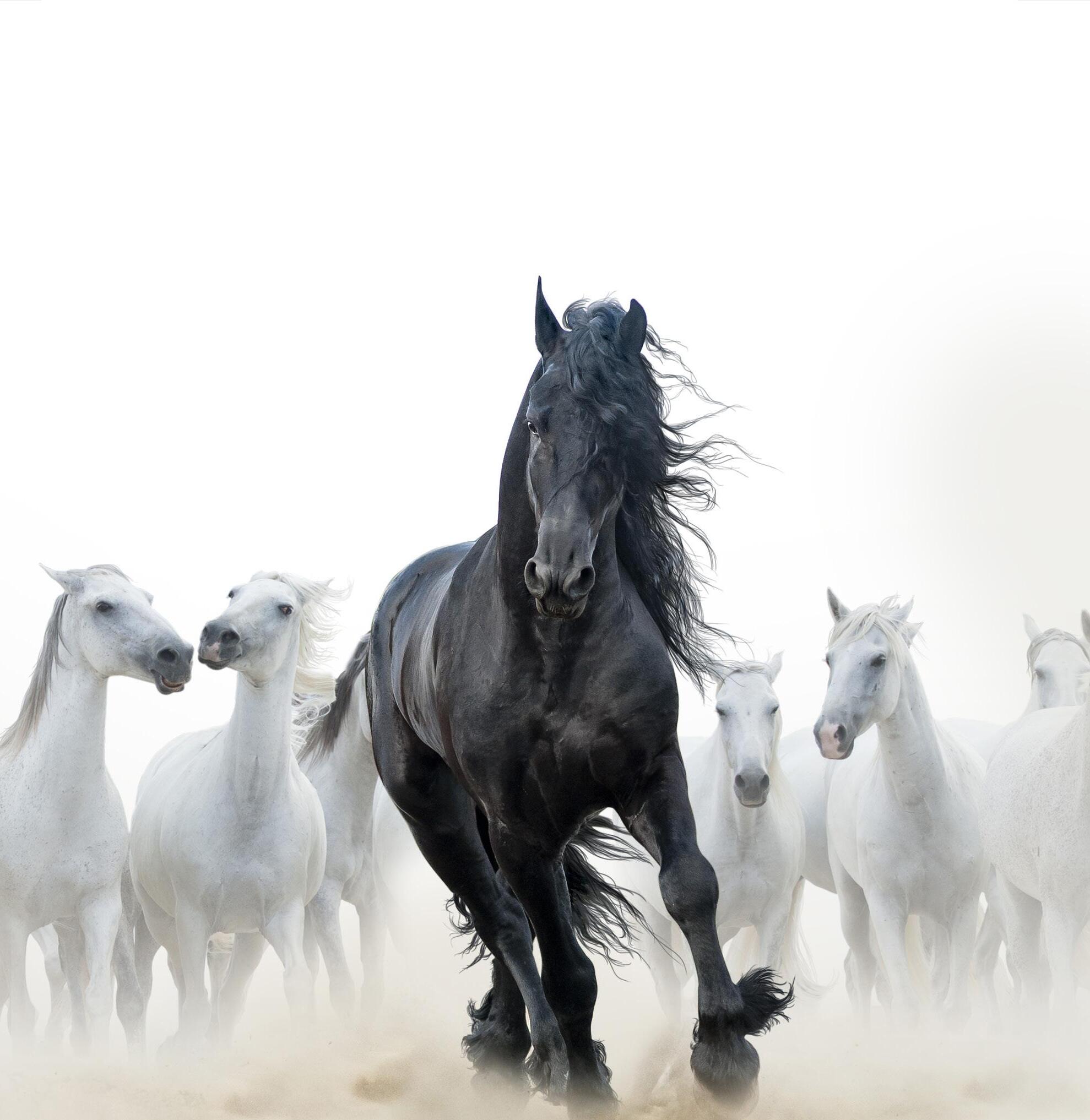








CVMA Fall Seminar in Palm Springs & Online

September 30–October 2, 2022
12 CEUs for veterinarians
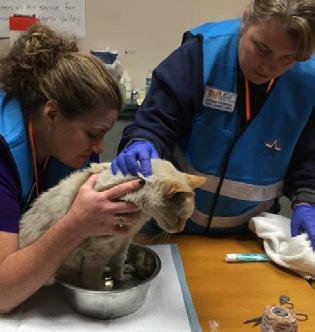
8 CEUs for technicians and CVMA CVAs
For more information, see page 8.
Sponsored by:
Publisher Dan Baxter
Managing Editor Kristen Calderon
Editor Taryn DeOilers
Classified Advertising Laura Phillips
Board of Governors
President Dr. Keith Rode
President-Elect
CAVMRC Online Disaster Response Training
October 23, 2022 | 7.5 CEUs
This course is available to CAVMRC members only. Membership is free and deployment is always voluntary.
For more information, see page 19.
Sexual Harassment Prevention Education and Training
November 2, 2022
5:00pm–6:00pm | Non-Supervisors | 1 CEU
5:00pm–7:15pm | Supervisors | 2 CEUs
November 9, 2022
12:00pm–1:00pm | Non-Supervisors | 1 CEU
12:00pm–2:15pm | Supervisors | 2 CEUs
For more information, see page 8.
CVMA Spring Seminar in Yosemite

March 3–5, 2023 | 12 CEUs
For more information, see page 12.
Sponsored by:
Registration for all CVMA events can be made online by logging onto cvma.net, via the CVMA mobile app, or by calling 800.655.2862
California Veterinarian (ISSN 00081612) is published bi-monthly by the California Veterinary Medical Association, e-mail: staff@cvma.net. California Veterinarian is an official publication of the California Veterinary Medical Association. Annual subscription rates to non-members: $50 U.S., $60 Canada/Mexico, $70 overseas. Price per single copy: $10 current year, $12 back issues. Periodicals postage paid at Sacramento, CA and at additional mailing offices. POSTMASTER: Send address changes to California Veterinarian, 1400 River Park Dr., Suite 100, Sacramento, CA 95815-4505. Phone: 800.655.2862
The CVMA and California Veterinarian assume no responsibility for material contained in articles and advertisements published, nor does publication necessarily constitute endorsement by them. ©2022 CVMA
Member-at-Large
Members
Dr. Michael Karle
Dr. Jennifer Hawkins
Dr. Peter Bowie
Dr. Patrick Connolly
Dr. Misty Hirschbein
Dr. Adam Lauppe
Dr. Julia Lewis
Dr. Peter Mangold
Dr. Diane McClure
Dr. Teresa Morishita
Kristi Pawlowski, RVT
Dr. Kevin Terra
Dr. Peter Vogel
Dr. Jodi Woods
Student Representatives
University of California, Davis Mary “Molly” Hallsten
Western University
Inez Rivero
Treasurer Dr. George Bishop
Chair, House of Delegates Dr. Laura Weatherford
CVMA Staff
Executive Director Dan Baxter
Assistant Executive Director
Director of Communications
Director of Finance
Director of Regulatory Affairs
Membership and Student Services Manager
Publications Manager
Accountant
Communications and CE Coordinator
Finance Coordinator
Meetings and Events Coordinator
Meetings and Events Coordinator
Membership Coordinator
Receptionist
Display Advertising
Della Yee
Kristen Calderon
Kathy Van Booven
Dr. Grant Miller
Laura Phillips
Taryn DeOilers
Bernice Evans
Nicole Campos
Sharmele Browne
Lily Briggs
Erica Ferrier
Jennifer Smith
Mary Young
Please contact Taryn DeOilers at 916.649.0599 ext. 16 or email tdeoilers@cvma.net.
us
Want to comment on what the CVMA is doing or writing about? Send an email to comments@cvma.net or call 800.655.2862. Your thoughts and opinions matter to us.
As we hit the last third of 2022, I am truly excited about the new initiatives and activities the CVMA has undertaken this year on a variety of fronts. Below are some of the items about which I am most enthusiastic:
New Website: The CVMA’s new website is live! We have overhauled the site with a more intuitive user platform and a completely different look and feel. The intent is for the site to be less dense and more user-friendly, and we hope we have met that goal. If you have any feedback you’d like to share—good, bad, or otherwise—after using the new site, we’d love to hear it, as we will be making tweaks in the coming months to ensure that the site is the best that it can be. Visit cvma.net to see what we’ve done and leave us your comments at staff@cvma.net!

New Inclusion & Diversity Committee: At its January meeting, our Board of Governors approved the creation of the CVMA’s new Inclusion & Diversity Committee. This committee (whose charge is found on the CVMA’s new website) is dedicated to cultivating diversity, equity, and inclusion within the CVMA and California’s veterinary profession as a whole. We have recently completed populating the committee with its “charter members,” and are looking forward to the committee’s first meeting. We can’t wait to get started!
Access to Veterinary Care Task Force: This task force—featuring participants from a variety of backgrounds and disciplines—had three meetings and additional informational exchanges dedicated to (a) producing a recommended CVMA position statement on access to veterinary care, and (b) determining what the CVMA and the veterinary profession can do to increase access in underserved and rural communities and beyond. Our position statement has been finalized and approved by the CVMA’s Board of Governors and may be found on the CVMA’s website.
One Health Position Statement: At its April meeting, with the assistance of a dedicated task force, the CVMA Board adopted a new position statement relative to the Global One Health initiative. This position statement, now posted on the CVMA’s website, brings the CVMA into alignment with other organizations, including the American Veterinary Medical Association, and emphasizes the importance of animals and veterinary medicine in our shared community.
Cocktails & Conversation: We have now held two virtual evening mixers—denoted “Cocktails & Conversation”—in which CVMA and local association representatives met to discuss issues of concern facing the veterinary profession, and ways that the CVMA and local groups can work together to share knowledge and information. Our second session, held on July 13, focused on (a) relevant legislative and regulatory goings-on in 2022, and (b) methods to increase local association engagement, including through continuing education offerings. We look forward to hosting more of these sessions in the future!
Committee Review Task Force: In addition to the creation of new committees, such as the aforementioned Inclusion & Diversity Committee, the CVMA’s 2022 Action Plan called for the CVMA to “review existing committees for utility and need for continuation.” To that end, we empaneled a task force dedicated to doing just that, considering whether to discontinue any committees, turn one or more committees into task forces, and/or meet on an as-needed basis, rather than on a predetermined schedule. As a result of that task force’s work, we have discontinued the Certified Veterinary Assistant Committee (whose work is completed) and are in the process of consolidating our Ways & Means and Leadership Development Committees into one body. We have also capped nearly all of our committees at eleven members, which we believe strikes an appropriate balance between securing a critical mass of opinion and avoiding the “too many cooks” syndrome.
Purchase of CAVMRC Mobile Command Center and Trailer: The “last but not least” item I want to mention is the California Veterinary Medical Reserve Corps’ (CAVMRC) purchase of a mobile command center and accompanying supply trailer. These vehicles—purchased with funds contributed by generous donations to the California Veterinary Medical Foundation, including from the Bernice Barbour Foundation—will allow CAVMRC personnel to more directly and effectively deploy to provide veterinary medical services to animals displaced by wildfires and other disasters. See page 27 for more information.
These are just a few of the things we’ve accomplished in 2022…we look forward to more successes over the balance of the year!
Dan Baxter, Executive Director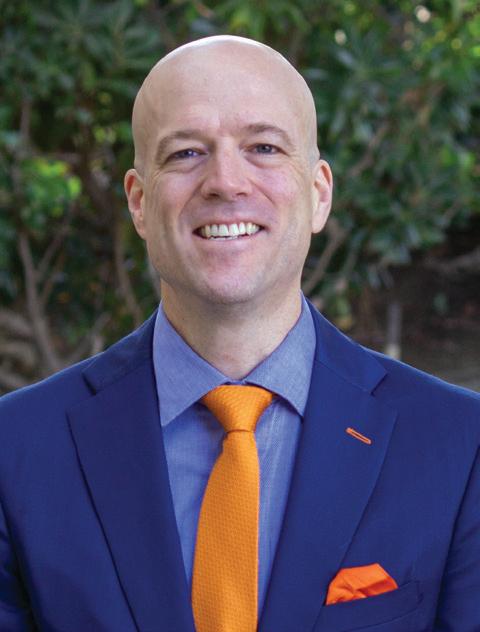
The moment had finally arrived. My shadowing period at my new practice was over and it was time to start seeing my own cases. Even though my mentors were nearby, I couldn’t help feeling nervous.
My very first case was a dog presenting for a castration. Simple enough, right? I had done castrations in vet school and reviewed the technique and possible anesthetic complications the night before. But what I didn’t anticipate was that this gigantic, very anxious dog simply wouldn’t go to sleep! Trying to skirt the line between too much propofol and too little, it took what felt like forever to achieve a plane of anesthesia appropriate for me to intubate. But I could hear my anesthesia faculty in my head, cautioning me to be patient, and we got there eventually.
Next up: a spay. But her pre-op bloodwork showed multiple abnormalities, and after a consult with my mentor, I had to call the owner to let her know the safest thing would be to postpone until we could get to the bottom of it. A tough conversation, but the right call for the pet.
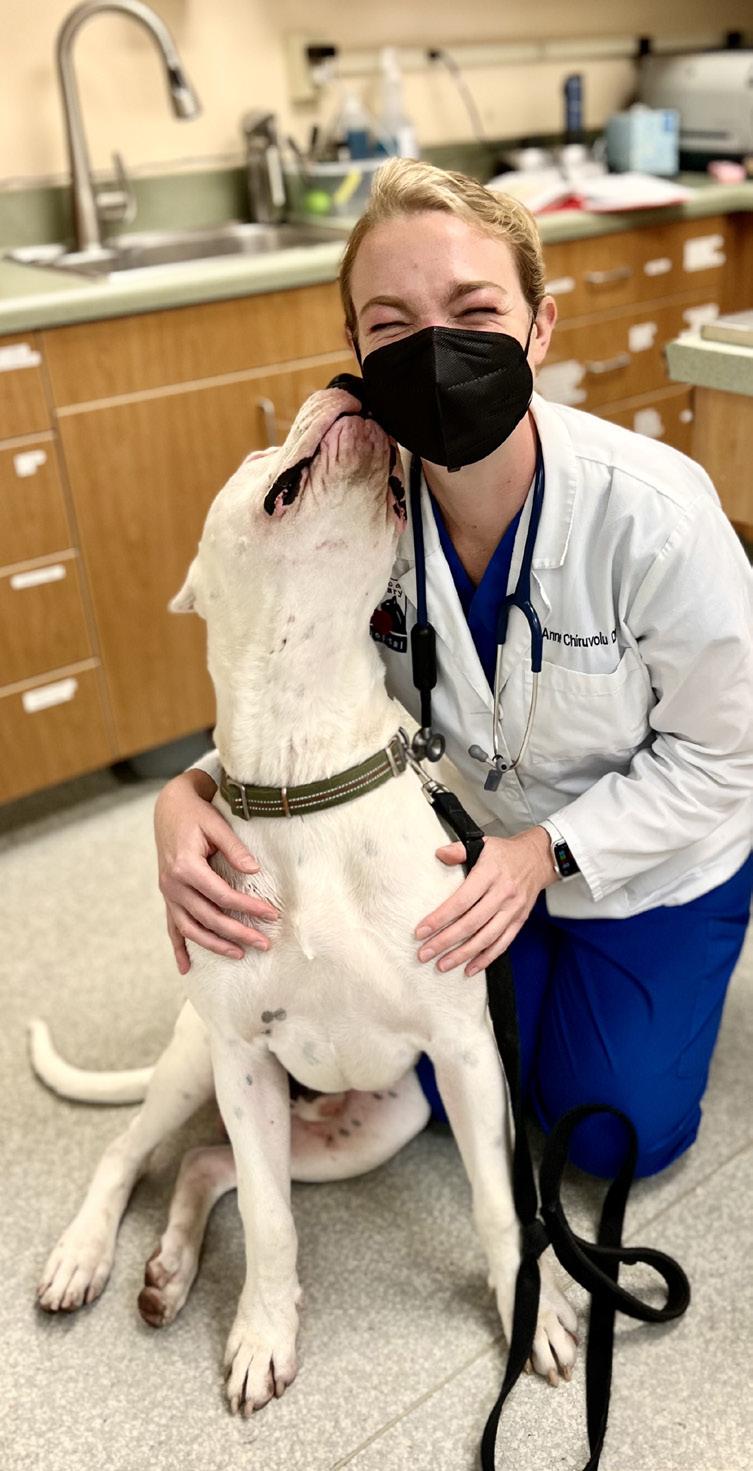
But the day had more in store for me: an afternoon of follow-ups, including a pet dropped off for severe pruritus that was refractory to the original treatment prescribed by my colleague. “How can I possibly help this dog?” I thought to myself. The owner was desperate and a little irate, having been kept up multiple nights in a row by their pet’s scratching. But I did my best, trying another combination of medications and a big dose of empathy. The owner left thankful for my help, and one of
my mentors reassured me, “Clients will bear with you through a lot if you can show them you genuinely care.” And I did—that night as I was falling asleep, I couldn’t stop thinking about whether that itchy dog was still scratching, whether my neuter patient was recovering well, and what my spay patient’s repeat bloodwork might show.
The next day brought new challenges, but also relief as I got the update that my neuter patient was doing well. In addition to routine wellness appointments, I treated a doodle with badly infected ears, a Chihuahua who needed a mass aspirated, and a cat who had lost a pound and was driving his owner crazy meowing constantly (any guesses?). As I was about to start my last appointment of the day, the receptionist called back to tell me there was an upset client who would not settle their bill until a doctor explained to them why diagnostics ordered last week were worth their money. Well, I guess I’m the doctor now, I thought as I took a deep breath and stepped into the exam room. I reassured the owners we are all on the same team, with the common goal of giving their senior pet the best quality of life possible. I drew diagrams to explain the pathophysiology of the issue and what our diagnostics had shown us about how best to treat it. By the end of our conversation the owners were thanking me and heading back to reception to settle up, apparently satisfied with the care we had provided. I breathed a big sigh of relief.
After checking and double checking my medical records, I was the last one out the door that evening, but I left with a smile on my face. I did
it! There were ups and downs, but my mentors and technicians had my back, and I actually was ready for this. And as if to confirm it, the lab work for that skinny, meowing cat came back: hyperthyroid, just as I suspected. I can treat that!
Here’s to more nights of good sleep free from hyperthyroid meowing, the sound of dogs scratching, and the anxious worries of a new doctor.
SEPTEMBER 30
Board of Governors Meeting in Palm Springs
OCTOBER 1–2
Board of Governors
Vision/Action Planning in Palm Springs
OCTOBER 18–20
Veterinary Medical Board Meetings
DECEMBER 7
VISC Board Meeting
DECEMBER 8
VISC Strategic Planning Meeting
JANUARY 20 & 22
Board of Governors/ House of Delegates
Meetings in Sacramento
CVMA President Dr. Keith Rode met Governor Gavin Newsom on June 21 during an evening event in Sacramento. The two discussed everything from family pets to pressing issues facing the veterinary profession, including the current overwhelming demand for veterinary services. The CVMA looks forward to continuing to advocate on behalf of veterinary professionals during the 2022 legislative session.

World Rabies Day has been observed globally since 2007 to raise awareness about rabies and to promote collaborative action in strengthening rabies prevention worldwide. World Rabies Day provides an opportunity for veterinarians, physicians, educators, policy makers, and other stakeholders to reflect on their efforts to control rabies—a preventable disease that nonetheless kills tens of thousands of people every year.
Visit rabiesalliance.org/world-rabies-day for more information and to schedule your own World Rabies Day activities.
JANUARY 21
CVMA Leadership Forum in Sacramento
National Veterinary Technician Week recognizes the critical role of veterinary technicians in veterinary practices, as well as their contributions toward preserving animal welfare. An annual tradition since 1993, National Veterinary Technician Week will be celebrated this year from October 16–22. The National Association of Veterinary Technicians in America is offering a media kit that provides suggestions and templates for celebrating the week.
Visit avma.org/national-veterinary-technician-week for more information.
CVMA Online Seminars are a quick, easy, and convenient way to fit CE into your busy schedule wherever you have a high-speed internet connection. The CVMA offers most interactive webinars on two different dates and times, allowing you to pick the presentation that works best for you.

Employers with five or more employees must provide sexual harassment and abusive conduct prevention training for all employees every two years. New supervisory employees must still be trained within six months of assuming their supervisory position, and new nonsupervisory employees must be trained within six months of hire. Additionally, temporary, seasonal, and other employees hired to work less than six months require this training within 30 calendar days after the hire date or within 100 hours worked, whichever comes first. This webinar will meet the requirement for one hour of training for non-supervisor employees and two hours of training for supervisors.
Register online by visiting the Learning tab at cvma.net, on the CVMA mobile app, or by phone at 800.655.2862.
at the
30–October 2 Palm Springs, CA
Come expand your veterinary expertise against the backdrop of a luxurious desert oasis. Located in Palm Springs, the 2022 CVMA Fall Seminar will present mornings full of world-class CE on the topics of cardiology, respiratory disease, and internal medicine. Free afternoons will allow attendees to indulge in all that the resort town has to offer, from golf to hiking to lounging poolside with a cocktail. There is no better— or more relaxing—way to broaden your veterinary skills!

The CVMA Fall Seminar will be offered both in-person and virtually. Visit cvma.net or the CVMA mobile app for full course descriptions and to register.
virtual
closes September 19, 2022!
c Hospital Manager at VCA Vets & Pets Animal Hospital and Part-Time Professor at Foothill College
c Practice: Small animal general practice
c Parkland College (Veterinary Technology) and St. Petersburg College (Combined Clinical and Hospital Management in Veterinary Technology)
I de-stress by going on early-morning hikes by myself.
If I could have dinner with any famous person in history, it would be cultural anthropologist Margaret Mead.
My favorite book is Mariquita: A Tragedy of Guam by Chris Perez Howard.
An area of veterinary medicine that I would like to explore is small animal, exotic, and specialty hospital management.
The five adjectives best describe me are resilient, sentimental, articulate, patient, and hard-working.
The most interesting places I have visited or lived are my island homes of Guam and Hawaii, and New Zealand where I visited in 2004.
I still want to learn how to speak and read fluently in Hawaiian, Samoan, and Maori.
I am a CVMA member because it is essential to being a registered veterinary technician in California, and allows me to advocate for the veterinary profession as an RVTg.
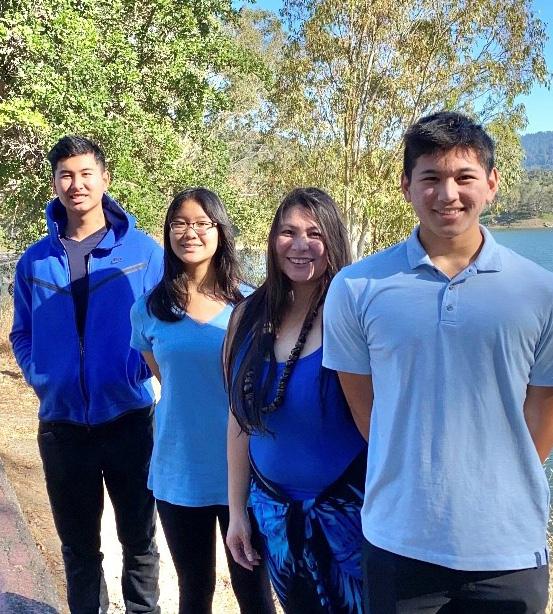
The CVMA legislative team continues to work with lawmakers through various channels in order to represent the interests of the veterinary profession during the 2022 legislative session. The governor now has until September 30 to sign or veto legislation that was sent to him in the final days of session. Below is an update on some of the more significant bills that the CVMA is following, including their current status as of the time of this publication.
CVMA Position: Oppose
This bill was held in the Senate Business, Professions and Economic Development Committee and will not progress this year. It would have restricted veterinarians from performing a declaw procedure on cats unless it is being performed for a therapeutic purpose.
The CVMA was opposed to this bill because it would have prohibited a veterinary medical procedure. The CVMA works to preserve the profession’s right to govern itself and believes that veterinarians need to have the ability to make decisions that are best for clients and patients on a case-by-case basis.
While AB 2606 is dead for this session, the CVMA is closely monitoring other legislation that could be amended to include some form of the subject matter contained in AB 2606.

CVMA Position: Neutral, as amended
This bill requires public animal control agencies, animal shelters, and rescue groups in California to provide notice to the public (either by posting in public view or by information provided at the time of adoption) that dogs and cats deserve certain protections and freedoms. Examples include a “freedom from exploitation, cruelty, neglect or abuse,” among others.
CVMA worked with the American Kennel Club, the Animal Health Institute, and the author’s office to remove problematic language earlier in the Session. As such, CVMA was able to remove its “oppose” position and is now “neutral” on the bill. This bill is awaiting vote on the Senate floor.
CVMA Position: Support
This bill will expand a veterinarian’s ability to communicate with clients about cannabis use in pets by making it lawful to recommend cannabis within the context of a valid veterinarianclient-patient relationship (VCPR). Current law permits veterinarians to discuss the use of medicinal cannabis for animal patients with clients but prohibits cannabis recommendation.
Recent amendments to the bill will prohibit equine and livestock veterinarians from recommending cannabis but will allow recommendation for all other types of animals. The CVMA voiced concerns over this amendment citing the need for all veterinarians to be able to have complete conversations with clients about cannabis.
At the time of the writing of this article, this bill is slated to be voted on in the Senate.
CVMA Position: Approve
CVMA is supporting SB 1029, which would “require the State Department of Public Health [and] the Department of Food and Agriculture […] to jointly establish and administer the One Health Program for the purpose of developing a framework for interagency coordination in responding to zoonotic diseases and reducing hazards to human and nonhuman animal health” using federal Centers for Disease Control and Prevention principles. The framework would be informed by consulting a stakeholder group, which may include schools within the University of California system, the California Veterinary Medical Board, the Medical Board of California, and other groups. Recent amendments add the California Department of Fish and Wildlife along with the California Department of Public Health and the California Department of Food and Agriculture as the entities charged with establishing the framework.
CVMA Position: Approve
This bill would have created grant funds for homeless shelters that include pets and allow the funds to be used for veterinary services. This bill was held in the Assembly Appropriations Committee and will not progress this year.
For specific information on bills or to track CVMA-monitored bills through the legislative process, visit the CVMA’s online Legislative Action Center. CVMA members can login to the site for detailed information on each bill.
Each year, the American Veterinary Medical Association (AVMA) selects exceptional veterinarians from across the nation to join the AVMA Fellowship Program. This program provides veterinarians the rare opportunity to directly shape public policy on a range of issues while strengthening their knowledge of political processes.

The AVMA announced in June that it has selected CVMA member Dr. Jacob Merryman to participate in the 2022–2023 AVMA Fellowship Program. Dr. Merryman will spend one year in Washington, DC as a full-time scientific advisor to members of Congress and/or congressional committees. Utilizing his veterinary expertise, Dr. Merryman will work on public policy issues on a national level.
Dr. Merryman obtained his veterinary degree from Western University of Health Sciences in 2019 and a master’s degree in Public Health from the University of Minnesota the following year. He currently works at VCA Sequoia Valley Animal Hospital in Santa Rosa, California, where he specializes in exotic animals,

reproduction, and public health. As a veterinary student, Dr. Merryman participated in the Smith-Kilborne Program, a training program sponsored by the USDA Animal and Plant Health Inspection Service Veterinary Services branch. There, Dr. Merryman learned how to manage and communicate about emergent animal diseases that threaten the health of animals, the public, and nations’ economies. A former extern for the U.S. Department of Agriculture (USDA), Dr. Merryman will be stepping into the AVMA fellowship with first-hand experience in the public policy sector.
Dr. Merryman became involved in organized veterinary medicine as the WesternU student representative to the CVMA House of Delegates and Board of Governors. He currently serves as a member of the AVMA Advisory Committee and is a delegate to the CVMA House of Delegates, representing his local Redwood Empire Veterinary Medical Association.
The CVMA congratulates Dr. Merryman and looks forward to seeing everything he will accomplish during his fellowship!
March 3–5, 2023 • Yosemite National Park
For years, veterinarians attending the CVMA Spring Seminar have enjoyed first-class continuing education presented in the stunning Yosemite National Park.

Now, registered veterinary technicians and CVMA Certified Veterinary Assistants are also invited to join us for this amazing weekend getaway CE opportunity!
Unable to attend in-person? The Spring Seminar will also be offered in a live and interactive online format!!
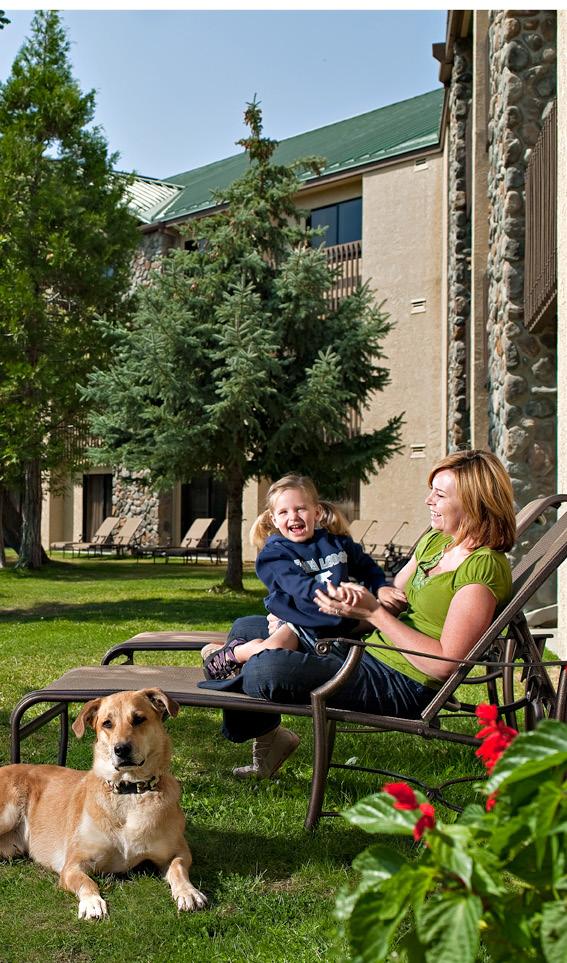
Earn up to 12 approved CEUs, broaden your knowledge thanks to top-notch speakers, and network with some of the brightest veterinary minds from across the West Coast. With courses held in the mornings, spend your afternoons exploring the splendor of Yosemite National Park and the surrounding area!
Situated among the towering pines and fresh mountain air, Tenaya Lodge at Yosemite provides a luxury resort experience with easy access to Yosemite National Park—located just two miles from the park’s south entrance.
A variety of room types are available to Spring Seminar attendees starting at the special rate of $179 per night with a discounted resort fee of $10 per night.
Discover a whole new side of Yosemite
• Tenaya Lodge at Yosemite is minutes away from the iconic Mariposa Grove of Giant Sequoias
• Daily tours offered into Yosemite Valley

• Explore hundreds of miles of trails
• Seasonal activities in the great outdoors
Take full advantage of this award-winning, world-class resort!
• Indoor pool open year-round
• Full-service, on-site spa
• Firepits for roasting s’mores with your family and colleagues
• On-site restaurants offering a variety of cuisines
• Luxurious guest rooms with mountain charm
• On-site activities
• Hotel is pet-friendly
REGISTRATION FOR THE CVMA SPRING SEMINAR WILL OPEN OCTOBER 17.
Speakers and session topics will be announced soon! Watch for email notifications or visit the Learning tab at cvma.net for the latest updates.
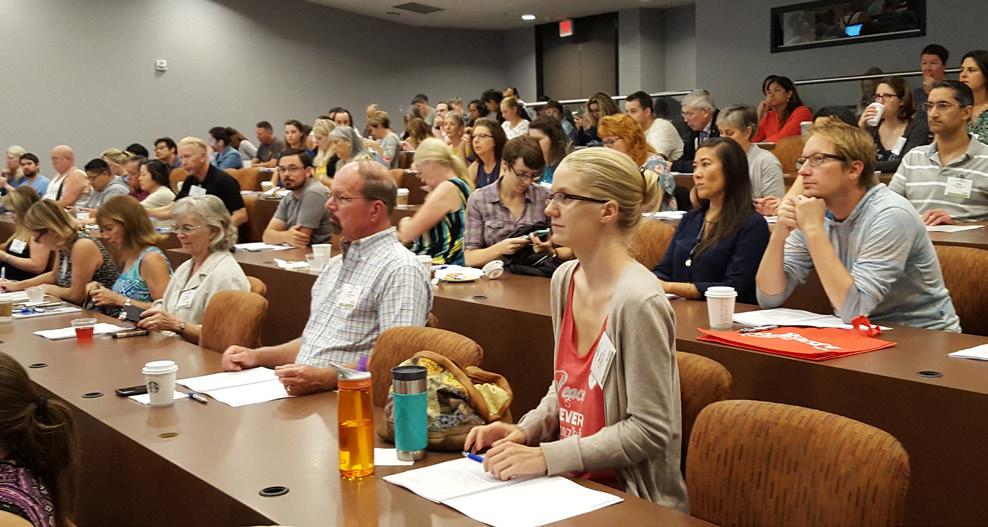
The CVMA is pleased to announce the five recipients of the Donald G. Low/CVMA Practitioner Fellowships for the 2022–2023 academic year. The 2022–2023 fellows and their service assignments (SA) are as follows:
Dr. Amanda Fiser



SA: Emergency/Critical Care
Adobe Animal Hospital
Los Altos, CA
Dr. Serena Gannon
SA: Soft Tissue Surgery
Modern Animal
San Francisco, CA
Dr. Shann Ikezawa
SA: Abdominal Ultrasound
Walnut Creek Veterinary Hospital

Walnut Creek, CA
Dr. Katherine Mills
SA: Behavior
Contra Costa County Animal Services
Martinez, CA
Dr. Joanne Sohn

SA: Anesthesia
California State Polytechnic University
Pomona, CA
The benefits of the fellowship include the following:
• Earning 100 continuing education credits
• Improving your skills and learning new ones
• Planning your 20-day specialty program (does not have to be one block of time)
• Progressing at your own pace
• Doing all of the above with no tuition or student fees!
The Don Low/CVMA Practitioner Fellowship is offered in a variety of specialty areas. Specialty areas offered in the past include anatomic pathology, anesthesia, behavior, integrative medicine, neurology/neurosurgery, nutrition support, ophthalmology, small animal emergency and critical care, small animal internal medicine, soft tissue surgery, and ultrasound.
This fellowship is a joint offering of the CVMA and the UC Davis School of Veterinary Medicine. It honors the late Donald G. Low, a former director of the William R. Pritchard Veterinary Medical Teaching Hospital. The CVMA led the campaign to fund this one-of-a-kind program in 1997 and partners with the school to recruit and select fellows.
Don Low fellows come from all over California. Apply now to bring your practical knowledge into the classroom and join in the learning experience with your future colleagues!
Don Low Fellowship will be accepted beginning September 5, 2022 and continuing through December 22, 2022 at 5:00 PM (PDT). Interested veterinarians may contact the UC Davis Center for Continuing Professional Education at 530.752.3905 or by email at svmcontinuinged@ucdavis.edu. Additional details may be found online at ce.vetmed. ucdavis.edu/fellows/don-low-fellowship.
Each year, the CVMA recognizes exemplary veterinary professionals through specifically designated awards. These awards are bestowed upon to veterinarians, registered veterinary technicians, organizations, and others who go above and beyond in contributing to the practice of veterinary medicine. We depend upon the greater veterinary community—which witnesses first-hand these extraordinary people, organizations, and animals—to provide us with nominations so that we can honor those who are truly exceptional.
Some of your colleagues have particularly risen to the occasion during this challenging period—working long hours while still finding time to mentor, devoting their free time to uplifting their communities, or participating in organized veterinary medicine to keep the needs of the profession front and center.
If you know someone who has made a significant difference and deserves to be recognized, please nominate them for one of the awards listed below. The deadline for nominations is January 10, 2023. Award recipients will be recognized in the May/June 2023 issue of California Veterinarian and honored at next year’s CVMA Awards and Installation Ceremony.

Lifetime Achievement
This is the CVMA’s most prestigious award, recognizing a member of the CVMA who has made noteworthy contributions to the advancement of veterinary medicine. Veterinarians who have demonstrated outstanding leadership in organized veterinary medicine and/or who have otherwise contributed significantly to veterinary medicine in California are honored.
Distinguished Life Membership
Distinguished Life Membership is the CVMA’s highest membership honor and is awarded to an individual who has significantly exceeded membership obligations through active participation in CVMA leadership.

California Animal Hall of Fame
This award honors animals who exemplify the affection, loyalty, security, and value of the human-animal bond through courageous and/or otherwise noteworthy accomplishments.
Outstanding RVT of the Year in Private Practice
This award honors RVTs in private practices who possess outstanding professional ability and takes into account educational achievements, individual contributions, professional affiliations, and special experience that sets them apart from others.
Linda Markland Outstanding RVT of the Year in Non-Private Practice
This award recognizes RVTs in non-private practices who possess outstanding professional ability and takes into account educational achievements, individual contributions, professional affiliations, and special experience that sets them apart from others.
This honor is awarded to a progressive veterinarian who utilizes their RVTs and staff to their fullest potential and emphasizes the importance of an educated, certified professional technical staff.
Nominees for this award can be an individual giving special attention to the human-animal bond, a special program or service offered by an organization, or a media publication that demonstrates a commitment to coverage of veterinary or animal-related stories.
This award honors those who have been excellent representatives of the profession through active community involvement and/or veterinary service, including participation in veterinary and/or non-veterinary groups and associations.
Additional descriptions of each award, nominating criteria, and nomination forms are available under the Membership tab at cvma.net. You may also contact the CVMA by calling 800.655.2862 or via email at staff@cvma.net for more information and nomination forms.
Registered veterinary premises in California must have measures in place to segregate, temporarily store, and dispose of unwanted pharmaceutical waste. Unwanted drugs include those that are outdated, adulterated, misbranded, surplus, or in some cases, have been returned by the client. Minimum standards regulations set forth by the Veterinary Medical Board (VMB) mandate that “all drugs and biologicals shall be maintained, administered, dispensed and prescribed in compliance with state and federal laws,” and that “the disposal of waste material shall comply with all applicable state, federal, and local laws and regulations.” (California Code of Regulations, Title 16, section 2030(f)(3) and (f)(6).) Because unwanted drugs are not permitted for use in patients, they are therefore subject to several rules to ensure their proper storage, transport, destruction, and disposal.
For purposes of managing unwanted drugs in veterinary practices, pharmaceutical waste can essentially be divided into three categories, each with distinct laws that govern
how they are handled once they are slated for disposal. The table to the right outlines each category and provides information about compliant handling and disposal.
While the VMB is the primary inspector to ensure compliance with all of the laws set forth by the California Department of Health (CDPH), the United States Drug Enforcement Agency (DEA), and the California Environmental Protection Agency Department of Toxic Substances Control (Cal EPA DTSC), technically any of the three have the legal authority to inspect without notice. Therefore, having a program in place that addresses proper onsite storage and disposal of unwanted drugs is important to ensure that no violations are noted in a veterinary practice.
CVMA members have access to a new member benefit with National Pharmaceutical Returns (NPR) for mail-back disposal of unwanted regular prescription and overthe-counter drugs as well as for reverse distribution of controlled substances.


The CVMA is pleased to announce a new member benefit offered through National Pharmaceutical Returns (NPR). CVMA members enjoy a 20% discount on mail back disposal services for:
• Unwanted prescription drugs
• Unwanted over-the-counter drugs
• Reverse distribution of unwanted controlled substances
CVMA members can access this discount by following these steps:
1. Log into cvma.net
2. Under the Membership tab and under Benefits: Member-only Access, click Practice Solutions
3. Scroll down to National Pharmaceutical Returns (NPR) and click on the link to fill out the registration form and follow the instructions
“Dangerous” (prescription) and over-thecounter drugs
This category includes the vast majority of drugs administered or dispensed in veterinary practice, including antibiotics, non-steroidal antiinflammatories, and many other commonly used drugs. They do not include controlled substances or drugs that are classified as hazardous materials.
Per Health and Safety Code Section 118280(d)(2), pharmaceutical waste must be placed in a container labeled “HIGH HEAT” or “INCINERATION ONLY” on the lid and sides, so as to be visible from any lateral direction. It may be stored at an onsite location for not longer than 90 days when the container is ready for disposal. Pharmaceutical waste may not be stored at an offsite location for more than seven days.
If being disposed of offsite, transportation and disposal of this category of pharmaceutical waste may only be completed by registered medical waste transporters approved by the CDPH or through a mail-back service pursuant to California Health and Safety Code Section 117900. If a veterinary practice chooses to institute an in-house pharmaceutical waste disposal system, special registration and approval from the presiding health department is required.
Controlled substances
Controlled substances include narcotics and other drugs with the potential for abuse or diversion. These are defined as all drugs included on the DEA Controlled Substances schedules.
While awaiting reverse distribution, the discarded controlled substances should be stored in a separate sealed box inside a locked cabinet with a label reading “Discardedfor Reverse Distribution.”
Discarded (unwanted, expired, or adulterated) controlled substances may be disposed of through a DEA-approved reverse distributor. Reverse distributors are service companies registered with the DEA and approved to inventory, transport, destroy, and dispose of discarded controlled substances.
Hazardous Drugs
Inhalant anesthetics in liquid form, epinephrine, reserpine, ethylene oxide, and certain chemotherapeutic drugs like chlorambucil are a few examples of hazardous substances utilized in veterinary practices.
Hazardous waste should be segregated in a clearly marked container labeled “Hazardous Waste - for Disposal” and should be removed from the premises within 180 days per California Code of Regulations, Title 22, Section 66262.34(d).
Hazardous waste must be transported and disposed of through Cal EPA DTSCapproved Hazardous Waste Transporters. A searchable database of Cal EPA-approved hazardous waste haulers can be found here: hwts.dtsc. ca.gov/transporters/
This article is for informational and general educational purposes only. It is not intended to take the place of legal advice nor should it be considered as a legal interpretation. Although significant effort has been made to ensure the accuracy and completeness of the information at the time of publication, the CVMA shall not be responsible for any errors or omissions, or any agency’s interpretation, application, or enforcement of the information presented herein.
All Roads Lead North! Enjoy fresh air, outdoors and the quieter side of California! Find your next prac�ce in Northern California!

· NCCH6 Butte County — NEW Listing! If you are looking for a 2 DVM small animal practice in a great community, loaded with recreation, and a practice that produces a high after-debt compensation level for the buyer so you can afford to do just about anything, then stop looking. You’ve found the right practice. This 2 DVM practice was established in 1991 and is in a 2,946 square foot leasehold space with 3 exam rooms. Current hours are 8am to 5pm Monday thru Friday. Open on Saturdays if desired or preserve your weekends and experience all the area has to offer. Nestled right next to the Sierras, you can be in the mountains in minutes or head south to Sacramento. Revenue has grown steadily over the past few years, 2021 was over $1.5 million. In addition to good growth and revenue this practice also has strong profitability. You can purchase the practice an d still expect to have approximately $400,000 in after debt income. If you love the outdoors, want time to enjoy it, and hate living on a budget you owe it to yourself to see this practice. Its a medical practice and money machine all rolled into one. Practice Price: $1,500,000

· NCLT5 Lake Tahoe — Small animal practice located in beautiful Lake Tahoe, CA. The practice was established by the owner in 2003. The leased facility is 3,840 sq. ft. on 1.25 acres. There was substantial remodeling in 2010. The practice also employs 1 relief vet part time. The practice is operational Monday thru Friday and they have a robust boarding business that has pick up and drop off hours on the weekends. Revenue growth has been steady and the 2021 gross was $1,277,286. This practice has high cashflow, and is projected to provide the buyer with over $350,000 of after debt income. Plenty to live well in the area and even hire another doctor. Practice Price: $1,100,000
· NCTC5 Trinity County — 2 DVM small animal practice located in a newer 4,000 sq. foot free-standing facility. This thriving business is in a peaceful recreational town loaded with historic buildings, art galleries, and dining; just minutes from numerous mountain activities. There are over 50 miles of trails for hiking, running, biking and horseback riding and one of Northern California’s favorite lakes is just a short 5-mile drive. All the big city conveniences are less than an hour’s drive. When the main part of California is baking in 100-degree heat, this mountain community is usually 20 degrees cooler with an average July temperature of only 94. Gross revenue has been over $1.6 million in the last couple of years. The buyers projected afterdebt income should be over $150,000. Practice Price: $850,000 Real Estate Price: $1,000,000.
· NC66 Redding California Price Reduced! Highly motivated seller! 1+ DVM small animal practice located in a freestanding building that is 2,400 square feet on nearly a 1-acre lot. It was built in 1998, has 2 exam rooms and is constructed of stone & brick. Operated Monday thru Friday with no current office hours on the weekends providing plenty of personal time off. No need to worry about emergency calls late at night or on weekends, there’s an emergency clinic just 3 miles from the practice. Revenue has been increasing yearly, 2021 was over $1.1M and 2022 should beat that. And that is on a 4.5 day work week! Buyer’s expected after-debt income is expected to be over $150,000 after both the practice and real estate loan payments. Practice Price: $650,000 Real Estate: $695,000.
SeeSouthernCalifornialistingsatwww.simmonsinc.com
Byron Farquer, DVM, CVA Bussell, DVMOctober 23, 2022 (Sunday)
Since its inception in 2009, the California Veterinary Medical Reserve Corps (CAVMRC) has provided veterinary medical care to thousands of animals in California disasters, including wildfires. To aid in its mission of training veterinary professionals to support animal and public health emergency response, the CAVMRC is offering a lowcost, one-day online continuing education course to veterinarians, RVTs, and veterinary assistants/students.

Animals in Disasters — Common Medical Conditions



7.5 CE Units
Christine Rutter, DVM, DACVECC
Jeannine Berger, DVM, DACVB, DACAW, CAWA
Grant Miller, DVM
This course will provide detailed information on emergency/ critical care topics that will benefit you in everyday practice as well as during a disaster response. This course will be presented online, allowing participants to attend from anywhere with a high-speed internet connection. The course will be live and interactive, allowing participants to ask questions, and will not be recorded.
TOPICS INCLUDE:
• Heat Illness
• Respiratory Issues/Respiratory Distress Management
• Trauma Management (Triage/Assessment)
• Minimizing Dog and Cat Stress in Animal Emergency Shelters
• Minimizing Equine Stress in Emergency Shelters
• Deployment in the CAVMRC
REGISTER BY OCTOBER 18
ONLINE at cavmrc.net
FAX registration form to 916.649.9156
MAIL registration form to the CVMA office
EMAIL registration form to staff@cvma.net
CALL 800.655.2862
COST: CVMA Members: $99
Non-Members: $129
DVM/RVT Students: $25
*By registering for this course, you are also registering to become a volunteer member of the CAVMRC if you are not already a current member. CAVMRC membership is free and participation in deployments is strictly voluntary. This course is only available to CAVMRC members.
The California Veterinary Medical Board (VMB) and its Multidisciplinary Advisory Committee (MDC) convened on April 19–21, 2022. CVMA Executive Director Dan Baxter, Director of Regulatory Affairs Dr. Grant Miller, veterinarian liaison Dr. Ken Pawlowski, and RVT liaison Nicole Dickerson attended the meetings on behalf of the CVMA. These meetings were conducted in a hybrid format, permitting the CVMA’s representatives to attend the meetings in Sacramento at the VMB’s offices. The following items were discussed:
• The VMB announced that Maria Salazar Sperber has been appointed as the most recent public member to the Board. Salazar Sperber has served on the MDC for over one year and brings experience as a previous board member on the Board of Optometry.
• The VMB voted to advance in the rulemaking process an amendment to California Code of Regulations, Title 16 (CCR16), section 2032.1 to exempt the administration of rabies vaccines from the Veterinarian-Client-Patient Relationship requirement. This is in response to the mandate for municipal animal shelters to provide lowcost rabies vaccines to the public, despite many animal shelters not employing a veterinarian.
• During the VMB’s January and April 2022 meetings, both the CVMA and numerous practitioners from racetrack and private equine practice requested that the VMB agendize a discussion of enforcement-related laws and
processes, particularly in relation to equine cases. In response to those requests, the VMB at its July meeting recommended that an MDC subcommittee be appointed to meet with the CVMA and other stakeholders to hear concerns and evaluate relevant regulations to determine if changes may be necessary or desirable. The CVMA will remain engaged in this process to represent equine veterinarians—and the profession as a whole—in voicing concerns about current regulations and related enforcement protocols.
• The CVMA participated in a robust discussion with the VMB about Access to Veterinary Care and presented the CVMA position statement and potential solutions to address the issue for the VMB’s consideration. Both the VMB and the CVMA maintain active task forces exploring ways in which the veterinary profession can help address this widespread public health problem. Relative to the VMB specifically, the CVMA sees opportunities for collaboration to help underserved families access veterinary care. In that regard, the VMB directed its task force members to review the CVMA task force’s list of possible solutions and determine if there are sections of the Veterinary Medicine Practice Act that should be revised to help address access to veterinary care barriers.
• The VMB appointed Dr. Linda Pirie to its Wellness Evaluation Committee.


The MDC discussed a pending rulemaking proposal regarding RVT school approval and student exemptions. This regulatory package has been in the works for several years and addresses various statutes and regulations that require clarifications on, among other items, (1) the criteria by which the VMB approves RVT education programs, and (2) the practice tasks that RVT students may perform commensurate with their education. The MDC voted to advance a portion of the package forward in the rulemaking process (CCR16, sections 2036.1 and 2068.5), but to hold back other sections for additional revision.
The MDC also extensively discussed further revisions to the Board’s recently instituted compounding regulations and reviewed a potential guidance document that would educate the veterinary profession on compliance with the new legal requirements. The VMB will seek statutory amendment in a future legislative session to allow Veterinary Assistant Controlled Substance Permit holders to formulate compounded medications in a veterinary practice. Current law permits only RVTs and veterinarians to compound, but public comment pointed out the need for others to perform compounding, as well.
The next MDC and VMB meetings are scheduled to take place on October 19–20, 2022, both online and in Sacramento.



A significant diversity, equity, and inclusion (DEI) issue facing the veterinary profession and broader society is the lack of access to veterinary care for many Americans, which threatens the well-being of pets and their families. The primary barrier to families is financial, with more than one out of four families reporting not being able to receive veterinary care, according to a 2018 report released by the Access to Veterinary Care Coalition (AVCC). Demographic, social, and economic trends suggest the problem is likely to worsen before seeing improvement. Veterinary medicine by itself cannot help all who are underserved. Ensuring access to care will require input from other important sectors including social service, public health, finance, and pet health insurance. Commitment from these various industries supporting veterinary care for families with limited means will result in positive change.
Underserved families are diverse. The largest affected demographic is comprised of asset limited, income constrained, employed (ALICE) persons, whose earnings fall above the Federal Poverty Level but below what is needed for basic essentials. Other
affected demographics are retired seniors and those unable to work.
Some will argue that a person who cannot afford a veterinarian should not have a pet. Despite the logic in that statement, the reality is that millions of pets live with families of limited means. Considering the physiological and psychological benefits humans derive from the human-animal bond, it is understandable why pets are so prominent in our society.
There are three approaches to addressing those underserved by veterinary medicine:
1. Ignore their needs
2. Deny them pet companionship
3. Help ensure they have access to veterinary care
The first two approaches are untenable. Ignoring the underserved will result in unnecessary suffering and/or premature death for animals and threats to public health. And denying one’s choice to have a nonhuman companion places us on a slippery slope of “regulating” relationships. Consequently, the best solution to the problem is to provide access to veterinary care to all individuals with pets.
The first sentence in the Veterinarian’s Oath contains a pledge to “use my scientific knowledge and skills for the benefit of society.” The society we serve is socioeconomically diverse. It is also biodiverse. The American Pet Products Association’s 2021–2022 “National Pet Owners Survey” reports that approximately 70% of U.S. households have pets. Eightyeight percent of the respondents in the AVCC’s 2018 study agreed with the statement that pets are family members. Similarly, in a 2015 survey by the Harris Poll, 95% of the respondents considered their pet to be a member of their family. Thus, U.S. families are biodiverse, and these bonded families (characterized by the human-animal bond) deserve access to healthcare for human and nonhuman members. Yet, too many are underserved.
Seeing the recent attention to DEI in veterinary medicine gives me hope that the profession will find a way forward in reflecting the society we serve. But we have a lot of work to do. In addition to focusing on human diversity inequalities related to race, ethnicity, gender, sexual orientation, and other characteristics, our efforts in relation to DEI must place equal importance on the national crisis of access to veterinary care—a crisis
that creates health disparities at disproportionate rates among racial minorities, women, and younger people with pets.
One of veterinary medicine’s primary social justice issues is the lack of access to veterinary care. Social justice in this context relates to the opportunity and privilege to receive care and is about equity and inclusion. As the only providers of veterinary care, the veterinary profession has a responsibility to help ensure access to care across society’s socioeconomic spectrum. The barriers to veterinary care primarily reflect the families’ realities and are not caused by the pets. Consequently, a One Health interprofessional (diverse) system is needed to reach a diverse population. Solving this societal problem is beyond what veterinarians alone can accomplish.
In the context of human healthcare, health equity means all members of society have the opportunity to achieve their highest level of health, and no one is disadvantaged in reaching this potential because of social position or other socially determined circumstances. Such social determinants of health generally apply to pets as well. Achieving health equity for animals and their owners will require valuing everyone equally and ongoing societal efforts to address avoidable inequities.
The lack of veterinary care (inequity) affects human as well as animal health. The threat that veterinary care access inequity poses to human physical and mental health is another compelling reason to address this issue. Zoonotic diseases are increasing, as are the populations of vectors. Leaving a section of the pet population untreated will only lead to an uptick in the frequency of diseases affecting human and animal populations.
Access to care inequity is also a detriment to human mental health— not only for the pets’ owners but for veterinary professionals as well. Possessing the knowledge and skills to treat an animal yet being forced to refuse care can lead to moral distress and depression.
Veterinarians are family healthcare providers who focus on the needs of nonhuman family members. From zoonoses prevention and control to safeguarding an owner’s mental and emotional health through the pet’s well-being, the veterinarian is “treating” the whole family. As providers of family healthcare, interprofessional collaborations yield better outcomes for all. Veterinary social workers (VSWs) are essential professionals facilitating the veterinarian’s role as a provider of family healthcare. VSWs are trained to meet human needs at the intersection of veterinary and social work practice. As members of the veterinary care team, VSWs enable the veterinarianclient-patient relationship (VCPR) to function at new and more effective levels. The veterinary care team can benefit from the support of a VSW—as well as the pet’s family.
Unfortunately, families are faced with healthcare systems that largely operate in silos. Family medical history about human and nonhuman members is not in a centralized database, thus making it very difficult to “see” the family as a whole. Also, human healthcare providers may not
factor in the presence and influence of nonhuman family members on the physical or mental health of their patient. In the case of zoonoses, this can lead to misdiagnosis or a delay in diagnosing a problem associated with the nonhuman in the family. Interprofessional clinical care will better serve our bonded-family society by strategically connecting the silos, if not outright tearing them down. Many challenges veterinarians face in reaching the pet needing help are human-related. Often, the client and veterinary care team will benefit from having other professionals assist. After all, the barriers to veterinary care are almost always human-related.
Access to veterinary care is a complex challenge that should not be ignored. This challenge transcends race, ethnicity, gender, and sexual preference, to name a few. Only through intent can we improve DEI in veterinary medicine. Likewise, it is only through intent that we can improve access to veterinary care.
Let’s embrace an expanded view of DEI in veterinary medicine, which means appreciating that:
1. Veterinarians serve a (bio)diverse society, i.e., bonded families.
2. All members of families deserve the potential for healthcare.
3. Inclusive interprofessional teams in One Health systems are better positioned to serve our diverse bonded family society.
Dr. Michael Blackwell is the director of the Program for Pet Health Equity at the University of Tennessee. He founded AlignCare Health, a One Health system that aims to improve access to veterinary care. Previously, Dr. Blackwell served as the dean of the College of Veterinary Medicine at the University of Tennessee, the chief of staff for the U.S. Office of the Surgeon General, and the deputy director of the Food and Drug Administration’s Center for Veterinary Medicine. He has received numerous awards, including the Distinguished Service Medal, which is the highest personal honor award of the U.S. Public Health Service.
“The mission of the Veterinary Medical Board (VMB) is to protect consumers and animals by regulating licensees, promoting professional standards, and diligent enforcement of the California Veterinary Medicine Practice Act.”
The VMB’s mission statement illustrates that its primary purpose is to regulate veterinarians and take enforcement actions when standards are not met. Although the VMB’s enforcement structure incorporates due process safeguards, the practical reality is that the VMB serves as both prosecutor and judge in the majority of enforcement actions. Nonetheless, the VMB’s enforcement procedures provide opportunities to resolve many transgressions without severely impacting a licensee’s ability to practice veterinary medicine.
There are two primary enforcement mechanisms utilized by the VMB: site inspections and complaintdriven investigations.
As mandated by law, the VMB conducts random and unannounced inspections of hospital premises. The VMB also conducts inspections arising out of complaints from consumers and other agencies.
Regardless of the reason for the site inspection, the VMB inspector shall complete a premises inspection report
noting any violations. Most violations are minor and result in a request for corrective action within 30 days, or “education,” or both. Ninety-seven percent of site investigations are closed without further enforcement action. Others may proceed towards an enforcement action as noted below. In the event of an immediate threat to public and animal health and safety, the VMB may issue an interim suspension of the premises license.
Hospital owners and managing licensees should take active steps to ensure that minimum standards are met. A “Hospital Standards Self-Evaluation Checklist” is posted on the VMB’s website. The VMB website also contains the inspection forms for small animal practices, mobile practices, and vaccination clinics. Adhering to these guidelines enhances the chances of completing a site inspection without violations.
Initial Triage: Jurisdiction – The VMB’s jurisdiction is limited to the investigation and enforcement of violations of the Veterinary Medicine Practice Act (VMPA) and does not include fee disputes and collection matters. If a complaint alleges a VMPA violation, the VMB will prioritize the investigation, with complaints of negligence and incompetence leading to death and serious injury, cruelty to animals, criminal convictions, and
drug or alcohol abuse as the highest priorities. An analyst will be assigned to conduct the investigation.
Preliminary Investigation: Letter to Licensee – A letter will be sent to the licensee(s) advising of the investigation. The VMB will likely request copies of medical records and radiographs. A response is mandatory. The licensee will typically be invited to submit a narrative response and witness statements. A short time for responding to an information request is provided. Analysts are generally receptive to providing an extension of time to respond upon request. At this preliminary stage, the analyst may also request information from other agencies and/or interview other witnesses.
Investigation – Upon completion of the preliminary investigation, the analyst shall close the case or refer it for additional investigation, which may include (1) transfer to a VMB consultant for review; (2) referral for a complaint-related premises inspection; and/or (3) referral to an expert for review. The investigator may also obtain sworn statements and/or information addressing specific questions regarding the complaint.
Determination of Action – Once the additional investigation is completed, the VMB will close the complaint, issue a citation and fine, or refer the case to the Office of the Attorney General.

Citation and Fine – The VMB’s “cite and fine” program is used to address less severe violations. Offenses commonly referred to the cite and fine program include recordkeeping violations, minor sanitary issues, expired premises permits and minor incidences of negligence or incompetence.
Procedurally, the licensee will be advised that a citation has been issued and of any financial penalties and education requirements. The licensee can accept the citation, pay any fine, and complete the education required. Alternatively, the licensee can request an informal conference, providing the licensee an opportunity to discuss the allegations directly with the VMB and reach a negotiated resolution. If the matter is not resolved by an informal conference, or if the licensee elects to forgo the conference process, the licensee may appeal the citation and fine, at which point the matter proceeds to the administrative law process.
The payment of any fine and the satisfaction of any educational requirements shall not constitute an admission of the violation charged. The citation, however, will be a matter of public record for five (5) years.
Attorney
Accusations: The Administrative Law Process – The VMB may determine that the severity of the alleged violations is of such magnitude that it is appropriate for the Attorney General to file an accusation against the licensee. Generally, these are cases where the VMB deems suspension and revocation of a license and possible criminal prosecution are appropriate. Separately, a licensee who is unwilling to accept a cite and fine order ay pursue an appeal through the administrative hearing process.
Administrative hearings are the regulatory equivalent of a trial and

are held before an administrative law judge (“ALJ”). Documentary evidence is presented and witnesses are questioned under oath. The ALJ will make findings of fact and law and apply the disciplinary guidelines in the form of a “Proposed Decision.” A licensee may (and should) be represented by counsel during this process.
The ALJ’s Proposed Decision is submitted to the members of the VMB for adoption by vote. If the VMB adopts the Proposed Decision, it becomes final in thirty (30) days, unless appealed. If the VMB votes to “non-adopt” the Proposed Decision, the hearing transcript is requested and reviewed by the VMB, written arguments are solicited from the licensee’s counsel and the VMB’s counsel, and the VMB subsequently issues its own decision. Once a decision is final, it is a matter of public record. Ultimately, an adverse decision of the VMB may be appealed by the licensee pursuant to a writ petition filed with the Superior Court. Permissible bases for such a petition, however, are limited.
The disciplinary process includes due process protections and provides licensees several opportunities to be heard and state their case. These rights, however, can be waived if affirmative action is not taken. All too often, a letter from the VMB to a veterinarian is simply set aside, resulting in a waiver of a defense or other compromise of rights. The first action of a veterinarian in response to an investigatory communication from the VMB should be to contact their insurance broker to determine if their coverage provides counsel to defend the action. Some, but not all, insurance policies provide this benefit. Regardless, counsel should be obtained. A professional license is too valuable to place in jeopardy.
National Preparedness Month is observed each September to call attention to the importance of preparing for disasters and emergencies. Planning ahead is particularly crucial in California, where severe wildfires have devastated communities at increasingly frequent rates, at times leaving only minutes for residents to evacuate.
Knowing which natural disasters can occur in your area and adequately preparing for them can help mitigate damage to yourself, your pets, and your veterinary practice. Make sure to create a thorough plan well before a disaster strikes, pay attention to the weather and official communications about nearby fires and other hazards, and be ready to evacuate at any hour. Careful disaster preparation can save your life and the lives of those around you.
Are you interested in using your veterinary knowledge and skills to help animals during a disaster? There is no better opportunity to do so than by joining the California Veterinary Medical Reserve Corps (CAVMRC). Since its inception in 2009, the CAVMRC has provided veterinary professionals the disaster preparedness training and emergency response credentials to help their communities during emergencies. During and after a disaster, animals may need specialized veterinary care due to injuries, malnutrition, sheltering stress, and more. During disaster responses, if requested to assist by local animal authorities, the CAVMRC contacts volunteers to determine if they are available to deploy during the response phase. When deployed, the CAVMRC provides free emergency medical care to all species of animals impacted by the disaster or emergency. Join the CAVMRC today to serve your community and help animals during disasters!
• Disaster deployment at the local and state levels based on pre-credentialing and affiliation during the early stage of an emergency response
• Training opportunities offering CE credits that help you improve your personal skills to more effectively serve your practice, community, and animals displaced or affected by disasters
• Updates from the CAVMRC and state agencies pertaining to general and animal health emergency situations
• Networking and information-sharing opportunities with veterinary team members across the state
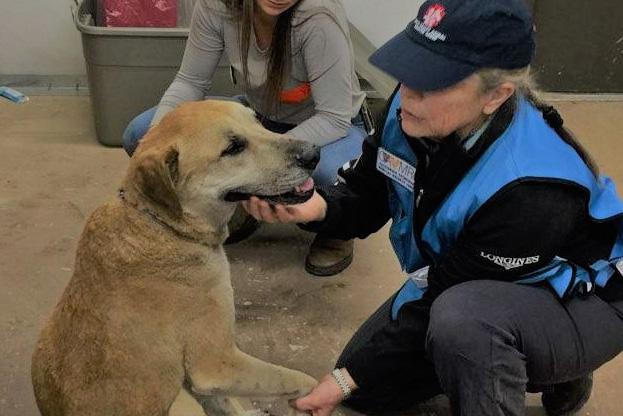
• Sense of fulfillment in knowing that you are making a significant, measurable difference for animals and your community
CAVMRC membership is free and open to California veterinarians, registered veterinary technicians, veterinary assistants, veterinary or RVT students, office managers, and all veterinary practice support staff members. To join the CAVMRC’s statewide team, please visit our website at cavmrc.net, complete a registration form, and return it to the CVMA by email at staff@cvma.net or by fax at 916.646.9156.

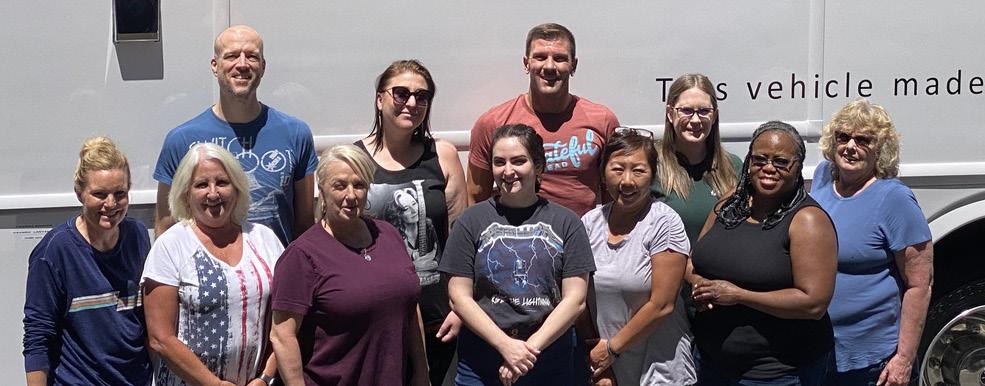

The California Veterinary Medical Reserve Corps (CAVMRC) is composed of thousands of volunteers who work tirelessly when deployed to provide free medical care to animals during disasters. These deployments—often spanning several weeks in remote areas—pose a tremendous challenge to CAVMRC volunteers, who must provide critical veterinary care in perilous conditions.
To help the volunteers better serve animals in need—and thanks to a generous grant from the Bernice Barbour Foundation—the CAVMRC purchased a mobile command center. This vehicle is a 40-foot Class A recreational vehicle that includes sleeping accommodations, two full-sized bathrooms, dual-zone air conditioners and heaters, two industrial-strength air purifiers, a 10,000-watt generator, WiFi and satellite capabilities, and more. In addition to offering a safer, more comfortable environment for CAVMRC volunteers, the mobile command unit will significantly aid CAVMRC personnel in transporting supplies, housing distressed animals, and communicating with one another within a centralized base of operations.
On Friday, July 1, the CVMA’s internal staff worked together to get the mobile command center fully equipped, organized, and ready for use during the next CAVMRC deployment. The command center’s necessary maintenance, fuel, and storage—as well as the CAVMRC’s deployment efforts—are supported by the California Veterinary Medical Foundation (CVMF).


Substance abuse affects people from all segments of society, regardless of age, income level, and background. The National Center for Drug Abuse Statistics reported that 21.4% of Americans ages 12 and over have used illegal drugs or misused prescription drugs within the last year.
Substance abuse is a particularly acute concern in the veterinary profession. Those in the profession face an inordinate amount of stress as a result of long work hours, difficult clients, clinical and nonclinical challenges, emotionally charged situations, and economic hurdles. These stressors can lead to vulnerability that, when combined with access to potentially addictive drugs, can put veterinary professionals at high risk for drug or alcohol abuse.
Untreated substance abuse can affect a practitioner’s health, relationships, finances, and work, which in turn can adversely impact their patients’ health and safety. Recovery is possible with professional help. Unfortunately, many in the profession are reluctant to seek help with drug use and abuse because of the stigma attached to the problem and the fear of license-related consequences.
To address veterinary professionals’ wellness concerns, the CVMA offers its members a complimentary confidential member assistance program, LifeWorks. In addition to 24/7 access to professionally trained consultants, LifeWorks also offers online resources on a range of wellness topics, including substance abuse. This member benefit is available to CVMA members and their direct family members.
On the LifeWorks website and app, members can utilize the Addiction and Recovery Toolkit, which addresses alcohol and drug abuse, tobacco, addiction among
adolescents and young adults, addictive behaviors, and finding treatment, help, and confidential support.
Articles within the toolkit provide information on substance addiction, recovery, and how to find professional support for yourself, a partner, child, parent, co-worker, or someone you care about. Articles on drug and alcohol abuse include but are not limited to:
• Addiction in the Workplace: Toolkit for Managers
• Are You Misusing Drugs or Alcohol to Cope with Depression or Anxiety?
• Alternatives to 12-Step Programs for Alcohol and Drug Addiction
• Co-Dependency in Families with Substance Abuse
• Marijuana: Health Effects, Prevention, and Treatment
• Prescription Drug Misuse: Causes, Signs, and Strategies
• Recovery Is Possible
• When Someone You Care About Abuses Drugs or Alcohol
• When Someone You Love Is Using or Abusing Opioids
• How to Help Someone Get Past Resistance to Drug or Alcohol Treatment
• Rehabilitation Treatment (“Rehab”) for Alcohol and Drug Addiction
Additionally, LifeWorks offers wellness assessments and their Care Now digital programs, including a program on Substance Abuse. The Care Now Programs offer short (3-15 minute) step-by-step modules with useful tools, including self-assessments, instruction, action plans, and advice to help you or a family member on the road to recovery.
LifeWorks provides confidential counseling and additional resources like articles, videos, and audio recordings on a variety of wellness-related topics, including relationships, mental and physical health, money, work, and more. CVMA members have been emailed an invitation to join LifeWorks. If you have not received this email or are unable to locate it, please email jsmith@cvma.net or call us at 800.655.2862. If you are not yet a CVMA member and would like to take advantage of this and many other valuable CVMA member benefits, visit the Membership tab at cvma.net to join.
El Dorado Union High School District offers a unique program to help staff veterinary clinics through their Regional Occupational Program (ROP), which is part of the California public school system. The ROP’s primary focus is to prepare students to successfully meet the everchanging nature of today’s technical workplace and to fill high-demand jobs with skilled applicants. High school students who are at least 16 years old or in their junior year of high school are eligible to register for this competitive ROP course.
Animal Health ROP is taught and directed by Julie Gilroy, a Registered Veterinary Technician (RVT) with decades of experience in veterinary medicine. The course focuses on small animals and equidae and consists of 250 classroom instructional hours and 250 handson hours in veterinary clinics and/or other businesses that serve the animal community. Upon completion of this course, students will have knowledge and hands-on experience in the areas of specific animal species, health and diseases, animal behavior, small animal procedures, and veterinary assistance. This course gives students
who might want to work with animals the ability to find out early if veterinary medicine is a realistic career path.
The cost of education for becoming an RVT or veterinarian can be a deterrent, especially when working with animals as a career is simply an abstract idea. Once a student has realworld, hands-on experience, however, they are better able to understand the value of working in the field while investing in further education. The program also helps identify those who are not right for the field and helps provide a stronger base of animal healthcare workers.
“The ROP and CVA programs were integral in helping me get my foot in the door of veterinary medicine,” said Jason Sousa, a veterinary student at the Texas A&M College of Veterinary Medicine and former student of Gilroy’s. “It was in a college search during my ROP class that I discovered my undergraduate major, poultry science. I am now thrilled to begin a career as a poultry veterinarian, a job I may not have ever known existed without these programs.”
As part of her curriculum, Gilroy utilizes the CVMA Certified Veterinary Assistant (CVA) Program in her ROP courses to help prepare her students for a future in veterinary medicine. The CVMA CVA program emphasizes basic training and skills in a variety of areas, including medical care, client communication and practice safety. The program integrates four learning components: (1) education through web-based learning, (2) experience via 600 hours of hands-on time with
a California licensed veterinarian or RVT, (3) evaluation of the individual’s ability to perform specific tasks, and (4) a final examination showcasing the learned skills. Students wishing to become a CVMA CVA may enroll in a third semester of ROP Animal Health.

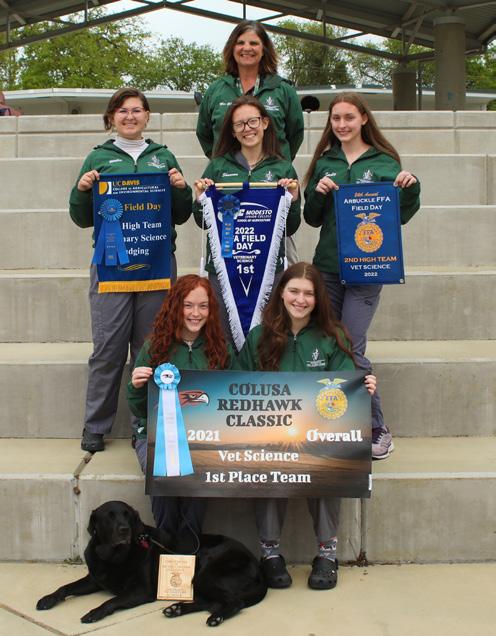
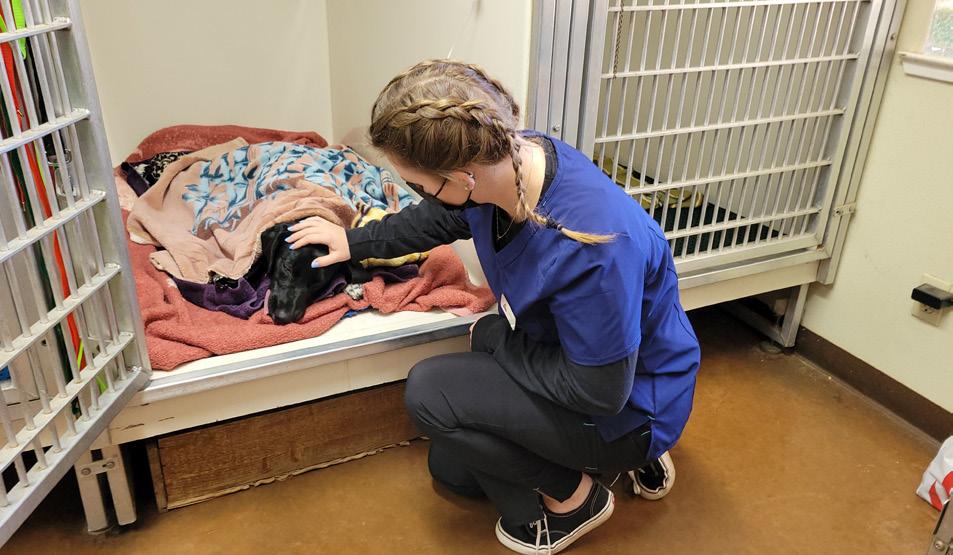
“As our students leave high school, they are set up for success when they have earned their CVA Certificate,” Gilroy said. “Not only are they finding employment, but they are also earning scholarships and getting into competitive colleges. There is nothing more rewarding than to hear, ‘Mrs. Gilroy, I GOT THE JOB!’”
The Animal Health ROP course is free to all high school students enrolled in a public school under the authority of the El Dorado County Office of Education. The program provides the necessary liability insurance for students to work outside the classroom and removes barriers to exploring a career in animal health, paving the road for future industry leaders. Programs like the ROP are the quiet heroes helping to fill employment gaps in the industry. We encourage veterinary professionals to seek out the Animal Health ROP programs in their community along with the Veterinary Science CDE teams to find out how to help support the programs’ efforts of filling the future needs and positions in the industry.
Sadie Alger is a student in the El Dorado Union High School District’s Animal Health ROP class.Your once-a-year opportunity to shop or make changes to your Medicare Advantage or Medicare Part D prescription drug plan is approaching. Medicare’s open enrollment period, also known as the Medicare Annual Election Period, begins each year on October 15 and ends on December 7. Any changes you make to these Medicare plans will go into effect on January 1, 2023.
Now is a good time to sit down and review your plans to better prepare and protect yourself. Medicare plan benefits and your needs change on an annual basis, so a yearly review is always recommended.
Changes related to your health that might have occurred during this past year include:

• Change in medication
• New medical diagnoses
• More frequent doctor visits
• Primary care physician or specialist no longer available
• Change to your Medicare Supplement options
Any of these scenarios could mean your current Medicare plan no longer meets your needs.
Medicare plans themselves can also change; the cost of your plan could go up or down, your prescription drugs could be added or dropped from the list of medications (the formulary) included in your plan, and some Medicare plans can change benefits or even stop offering coverage in a particular location.
During the Medicare Election Period, individuals can choose between two paths—the Medicare Advantage path or the Original Medicare path. Some people opt for the Medicare Advantage path, which operates like a
health maintenance or preferred-provider organization. Many Medicare Advantage plans have gained popularity in part because, when compared to a Medigap policy, they generally cover a wider array of benefits, often including prescription drugs and dental care. Many Medicare Advantage plans also charge lower premiums, but require members to use the plan’s network of providers. It is also recommended that if you a have a primary care physician or specialist that you would like to use, you make sure they accept that particular coverage for the upcoming year.
Others may opt for or return to Original Medicare and also purchase a private Medigap policy, as well as a separate prescription-drug policy, to cover holes in their coverage. Medigap coverages are standardized, meaning the coverages are the same from company to company; however, price and service may vary. There are several different types of Medicare Supplement or Medigap plans offered that are identified by a letter. The Medigap plans currently offered are Plans A, B, D, High Deductible F, G, K, L, M, and N.
Each Medigap plan offers different levels or degrees of coverage with some being much more comprehensive than others. Simply put, the more coverage offered, the higher the monthly premium.
Medicare can be a confusing process but a very important one. Because of these changes, you should take the time to check your current Medicare plan and, if necessary, switch to another plan that better fits your current needs. You can compare your needs with current Medicare plans by contacting Veterinary Insurance Services Company, the CVMA’s insurance brokerage, at 888.762.3143 or 916.921.2260 and asking to speak with agent Matt Smith. Other options include visiting Medicare.gov or calling 800-Medicare (800.633.4227).
California has seen an unusually high number of positive cases of Equine Infectious Anemia (EIA) in 2022. Thirty-five cases of EIA have been confirmed in California on five premises in 2022, with 27 of those epidemiologically linked and limited to a subset of racing horses.
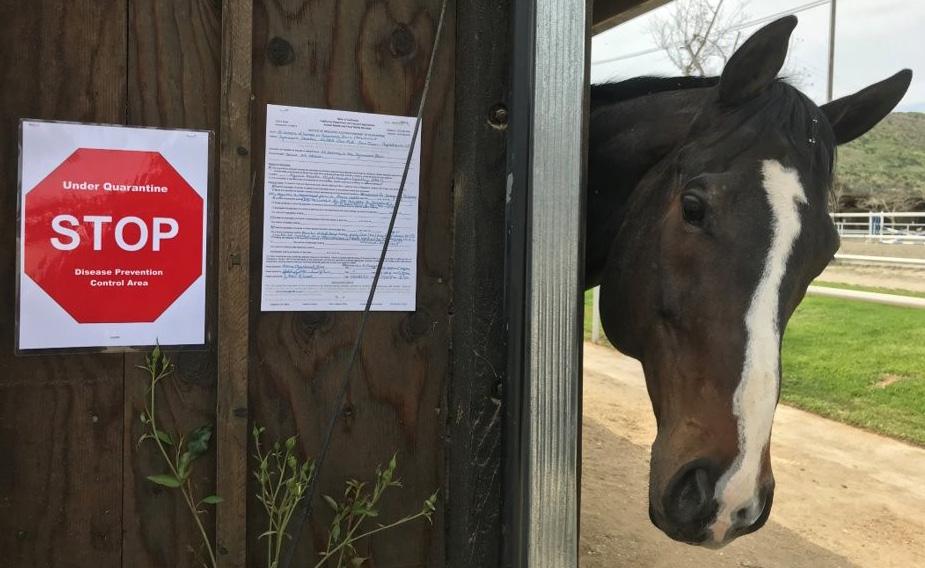
EIA is a viral disease that affects only members of the Equidae family,
including horses, donkeys, mules, and zebras. Clinical signs range from an asymptomatic carrier state to fever, inappetence, severe anemia, and sudden death. Viral transmission is bloodborne, naturally through insect vectors like horseflies and deer flies, or iatrogenically (artificially by human intervention) via contaminated blood products or other intravenous (IV) substances, or via contaminated IV
equipment like hypodermic needles and/or syringes. In all recently confirmed cases in California, epidemiological investigations indicated viral transmission was very likely iatrogenic.
EIA is a reportable condition in all states. A negative EIA test, commonly referred to as a Coggins test, is required for legal entry of adult
equids into all 50 states and some equine venues and racetracks. A negative EIA test is also strongly recommended prior to purchase or adoption of any equid. Only licensed and United States Department of Agriculture (USDA) Category II-accredited veterinarians can collect and submit samples to federally approved laboratories for EIA testing. Both enzyme-linked immunosorbent assay (ELISA) or agar gel immunodiffusion assay (AGID or the Coggins method) are approved testing methods. AGID is the gold standard for EIA testing and the confirmatory test for an ELISApositive EIA test.
There is no vaccination or treatment for EIA, and infection is lifelong. As such, animals testing positive must be
euthanized or quarantined 200 yards away from all other non-infected equids for life.
While vector control to reduce equid exposure to biting flies is essential for disease prevention, bilingual education and outreach emphasizing the severe and potentially fatal risk of reusing IV equipment and/ or unlicensed blood or IV products is critical to preventing iatrogenic spread of EIA. Needles, syringes, and IV administration sets should never be reused, and only sterile, new needles should be used when administering appropriately labeled injectable medications and approved blood products. Blood transfusions should be performed only by licensed veterinarians using donor blood screened negative for EIA and other
blood-borne pathogens, such as equine piroplasmosis.
Ongoing outreach and education regarding disease prevention as well as continuing to foster active communication and strong working relationships between veterinarians, clients of all disciplines, and animal health officials remain priorities and hurdles for the control and future eradication of this challenging equid viral disease.
Additional information about EIA and viral transmission and prevention can be found on the California Department of Food and Agriculture EIA website, as well as on the USDA EIA website and the American Association of Equine Practitioners website.
CDFA’s Antimicrobial Use and Stewardship (AUS) program has released the 2020–2021 Veterinary Feed Directive Summary Report.

The report is broken into four main sections: an executive summary; two years of aggregated data tables on Veterinary Feed Directives (VFDs); manufacturing and distribution; and a conclusion discussing CDFA’s future steps toward reducing antimicrobial resistance in animal agriculture. Each streamlined report section has the goal of providing complete transparency into VFDs, updated AUS goals for education, outreach, and VFD compliance, and how these goals play a part in maintaining and promoting a high standard of public health.
To view the 2020-2021 VFD Summary Report, visit cdfa.ca.gov/is/ffldrs/pdfs/aus_vfd_summary_report_20-21.pdf.
The CVMA extends our sincere sympathy to the friends and family of those remembered.
Dr. Clark Kelly, a CVMA Life Member, passed away on June 15, 2022. Dr. Kelly graduated from Colorado State University in 1954 with a DVM degree. After graduation he entered the U.S. Air Force, working as a veterinarian and serving for four years as a Captain. In 1965, he and his wife purchased Boulevard Animal Clinic in San Diego, California, where he practiced for 57 years until his passing.
Dr. Ralph Smith, a CVMA Life Member, passed away on April 9, 2022. Dr. Smith earned his DVM degree from UC Davis in 1955. He began his career in Lancaster, California and eventually opened a small animal practice, which he operated for 25 years. Dr. Smith spent several years working as a relief veterinarian throughout Southern California. He later moved to San Diego in 1983 and worked at his own practice until he retired in 1994. He is survived by his daughter, son, two grandsons, and five great-grandchildren.
In memory of deceased members, the CVMA makes a donation to the California Veterinary Medical Foundation, whose mission statement reads: “Nurturing kindness, education, and well-being for all animals, people, and the environment.”

What is the CVMA InLine Program?
Jenni Cave, RVT, for graduating from the Veterinary Technology Program at Cosumnes River College in Sacramento this past May and for passing the Veterinary Technician National Exam (VTNE®) in July. Jenni decided to change careers in 2019 in order to follow her dream of helping animals. She will be starting her next chapter as an RVT at Mid-Valley Veterinary Hospital in Orland under the guidance of the CVMA’s President-Elect, Dr. Michael Karle. We are happy to have you in the profession, Jenni!
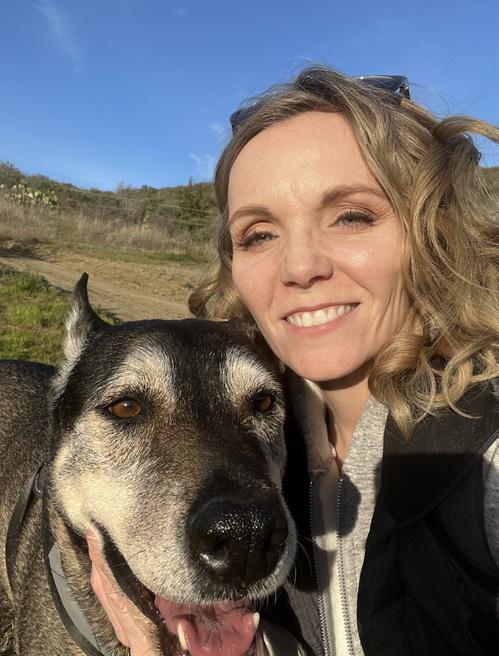
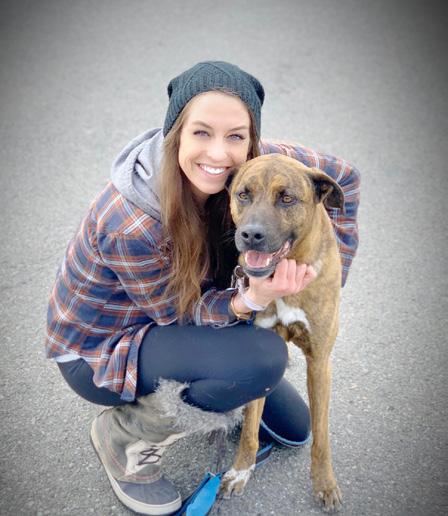
Diane Craig, DVM, and Richard Pankowski, DVM, whose daughter Annie recently got married to her partner Gavin Nieto. Their wedding took place at Ella’s Vineyard in Paso Robles on May 28. We congratulate Drs. Craig and Pankowski on the beautiful wedding of their daughter, and we wish Annie and Gavin a life together full of love and happiness!

Barbara Dworak, DVM, for summiting Mount Whitney, the highest mountain in the United States, this past July. Dr. Dworak started hiking when she moved to the area in late 2020 and trained more intensely in the months leading up to Mount Whitney. The hike took her over 14 hours to complete, and she achieved this feat as a solo hiker. Well done, Dr. Dworak!

Andi Flori, DVM, for being awarded the 2022 Veterinary Heroes award from dvm360 in the category of Oncology. This award celebrates the achievements of veterinary professionals who have helped propel the field forward. Dr. Flori was nominated by her peers and recognized for her work in bringing liquid biopsy—cancer detection with a simple blood draw—to reality for dogs and in spreading awareness about early cancer detection. Dr. Flori and the other Veterinary Heroes inductees were honored on August 25 at the Fetch dvm360 conference in Kansas City, Missouri. Congratulations on this award, Dr. Flori!
Lynn Hendrix, DVM, for getting her book, Animal Hospice and Palliative Medicine for the House Call Veterinarian, published. Dr. Hendrix, the owner and founder of a house-call palliative care and in-home euthanasia mobile veterinary service in the Sacramento area, wrote the book as a practical guide to veterinary palliative medicine, touching on topics like end-of-life care, pain management, grief support, burnout, compassion fatigue, and more. Wonderful job on getting published, Dr. Hendrix!
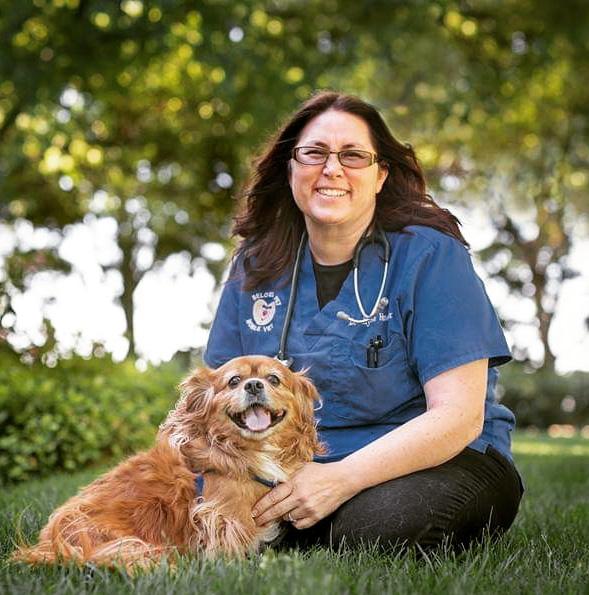
The CVMA can help you with all your regulatory compliance needs. Visit cvma.net/products.
The CVMA offers a series of 8 ¾” x 11 ¾’’ laminated plaques, suitable for hanging in your practice, designed to meet a number of regulatory requirements!
Required Postings
• Proposition 65 Warning (for practices with more than 10 employees)
• Continuous Presence Not Provided (required if animals will be left on the premises for any period of time without someone present)
• California Abandoned Animal Act (if you hospitalize/board animals)
• Financial Interest Disclosure (if applicable)
• Written Prescriptions (gives clients written notification that they have the right to receive a written prescription)
Not Required but Recommended
• Prescription Drug Dispensing (helpful in explaining restrictions to clients)
The Radiation Compliance Kit is custom-designed to fulfill all of the regulatory requirements for veterinary practices with radiationproducing machines. It includes required postings, the “Caution X-Ray” sign, radiation safety training materials, and detailed instructions on how to implement a radiation compliance program.
Various regulatory agencies require that every employee be given several pamphlets at the time of hire. Employers should provide the pamphlets to all current employees if they did not receive them at the time of hire.
The CVMA Guide to Cal/ OSHA Compliance is available only to CVMA members and is designed to help veterinary practices comply with the Department of Industrial Relations Division of Occupational Safety and Health (Cal/ OSHA) regulations. It includes educational materials, required forms, training templates, implementation and recordkeeping resources, and a step-by-step wizard that simplifies the process of creating a customized written health and safety plan for your practice that complies with Californiaspecific requirements.
Cal/OSHA Requires Employers to Provide COVID-19 Worker Protection
Cal/OSHA regulations include a requirement for a written COVID-19 Protection Program policy as part of the Injury and Illness Prevention Program (IIPP). The CVMA Guide of Cal/OSHA Compliance has recently been updated to include the required COVID-19 component.
The CVMA Guide to Cal/ OSHA Compliance is available only to CVMA members. The online subscription-only guide can be accessed and updated at any time.
Regulatory Plaques (please specify)
� Abandoned Animal Act (VMB requirement)
� Prop 65 warning for employees (Required for practices with more than 10 employees)
� Continuous Presence Not Provided (VMB requirement)
� Written Prescription Drug Dispensing — Prescription Required (Satisfies requirement for written notification)
� Financial Interest Disclosure Plaque (VMB requirement, if applicable) Name(s)
Full Name: Phone#:
Hospital Name:
Shipping Address (no PO Box #s):
City, State, Zip:
Check enclosed made payable to CVMA MasterCard VISA Discover AmEx
Card Number: Exp. Date: CVV:
Signature: Date:
Please allow up to five business days for the CVMA Guide to Cal/OSHA Compliance order to be processed. You will then be able to view the guide online by clicking on the CVMA Guide to Cal/OSHA Compliance link at the bottom of the CVMA-InLine website home page after you login. Please allow up to three weeks to receive the New Hire packets and the plaques. All returned items are subject to a 15% restocking fee; shipping charges on returns are the customer’s responsibility. Credits will be issued only for returned item in original condition within 30 days.

On August 16, new students at the UC Davis School of Veterinary Medicine were welcomed into the profession during their first-year presentation. Dr. Grant Miller, the CVMA’s Director of Regulatory Affairs, spoke to the students about the CVMA’s work, the benefits of CVMA membership, and the five years of complimentary membership that each student receives. Matt Smith of Veterinary Insurance Services Company (VISC), the CVMA’s member-owned insurance brokerage, outlined the products and services offered by VISC. Laura Phillips, CVMA’s Membership and Student Services Manager who worked with the university to prepare and coordinate the event, was also in attendance.
CVMA President Dr. Keith Rode welcomed the new UC Davis veterinary students on August 19 during the school’s White Coat Ceremony. Dr. Rode discussed the many exciting twists and turns the students’ veterinary journey might take, and encouraged them to embrace every learning opportunity, accomplishment, mistake, and experience, and to cherish the new friends, mentors, and colleagues they meet along the way.
On August 3, WesternU’s College of Veterinary Medicine greeted its first-year students at an in-person event put on by the school. Dr. Miller presented on the CVMA’s work and the benefits of being a member, and offered free membership to the students throughout their five years in veterinary school. Art Cruz of VISC summarized the importance of having insurance coverage tailored to the specific risks of veterinary medicine. Laura Phillips of the CVMA prepared the event and was also in attendance.
WesternU’s White Coat Ceremony took place on August 7. Dr. Rode congratulated the WesternU students on their acceptance and welcomed them to the profession. In his speech, Dr. Rode gave the students tips for their forthcoming veterinary school expedition, including trying new experiences and branching out, prioritizing their mental health, leaning on their peers, and being open to the wide range of possibilities available to them in veterinary medicine.
1: First-year students at UC Davis listen as Dr. Grant Miller outlines the history and benefits of the CVMA.
2: From left to right: Dr. Erik Olstad, Health Sciences Clinical Assistant Professor; Dr. James Clark, Health Sciences Clinical Professor; CVMA President Dr. Keith Rode; Molly Mettler, student speaker and President of Student American Veterinary Medical Association; and Dr. Anjali Daryani, guest speaker and UC Davis alumna.

3: Matt Smith of Veterinary Insurance Services Company welcomes incoming veterinary students at UC Davis.

4: The UC Davis Veterinary Class of 2026 attends the White Coat Ceremony at the Mondavi Center for the Performing Arts.
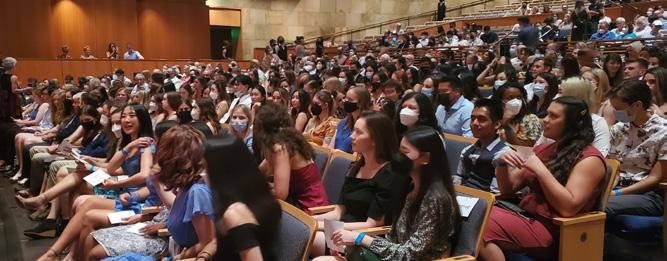
5: Dr. Grant Miller, CVMA’s Director of Regulatory Affairs, speaks to the incoming veterinary class at UC Davis.


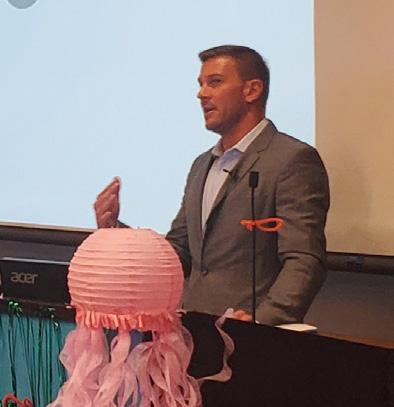
6: Art Cruz of the Veterinary Insurance Services Company speaks to the first-year veterinary students of WesternU about the importance of VISC.
7: From right to left: CVMA President Dr. Keith Rode, WesternU College of Veterinary Medicine Dean Dr. Phillip Nelson, and keynote speaker Dr. Andrew MacCabe pose together at the WesternU White Coat Ceremony.
8: First-year veterinary students at WesternU enjoy a lunch complimentary of the CVMA and VISC.

The CVMA congratulates the following recipients of the CVMF/VISC Student Scholarship Award and the Ron Faoro, DVM, Student Scholarship Award.
This award was established in memory of past CVMA President Dr. Ron Faoro and is administered by the CVMF. Recipients of this award are presented with $2,500 scholarships for their role in leadership.
Congratulations to the following students:
Alison Pankowski – UC Davis
Adam Wiegand – WesternU

The California Veterinary Medical Foundation (CVMF), in partnership with the CVMA’s insurance brokerage company, Veterinary Insurance Services Company (VISC), established this scholarship award through donations from VISC.
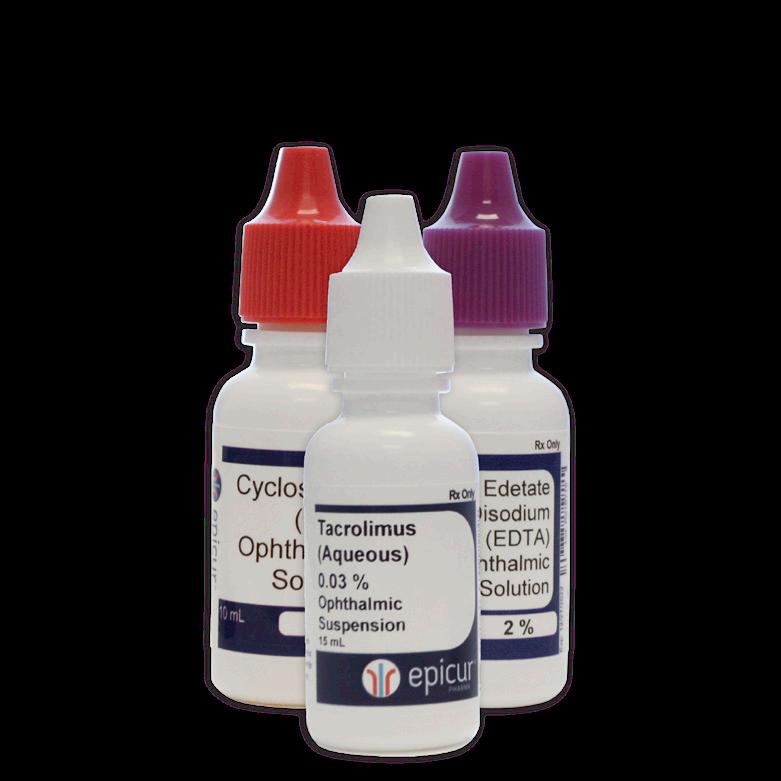

We are pleased to congratulate the seven veterinary students who were awarded scholarships of $1,000 in June 2022.
UC Davis
Alison Pankowski
Claire Stuhlmann
Melissa Rubinow
Christine Haake
Anna Riedl
WesternU
Jimmy Guan
Elizabeth Tuff
Thanks to a generous gift, the Western University of Health Science’s College of Veterinary Medicine (WesternU) has established the Drs. Daljit and Elaine Sarkaria Professor of Veterinary Dentistry position. This position marks the college’s first endowed professorship. WesternU plans to have the new professor in place by 2023.
“This professorship will allow WesternU to be more competitive in attracting a faculty member skilled in the veterinary dentistry field, which will give our students advanced skills and better preparation for their careers,” said Dean Phillip Nelson, DVM, Ph.D. “We are most grateful for this generous gift and will begin procedures to fill this position.”
While dentistry is a critical part of a comprehensive veterinary curriculum, it is becoming increasingly difficult for a college to compete with private sector demands for a specialist in the field. Establishing a named professorship

Veterinarians looking to refer a case to the UC Davis Veterinary Medical Teaching Hospital (VMTH) can bypass the hospital’s main telephone line and use the direct referral line at 530.752.4050. Referral coordinators for specific specialty services can also be contacted directly for appointments and consultations.
As valued referring veterinarians, rather than using the main telephone number used for the general public, you have direct access to a team of dedicated client service representatives at the VMTH. We strongly recommend you utilize these highly trained contacts to enable a faster and more efficient referral process. Our referral coordinators will respond to your needs and connect you with a veterinarian should you need consultation on a case.
in veterinary dentistry will provide additional funding and prestige to enhance the college’s recruitment efforts.
The veterinary dentistry field has existed for thousands of years, but it has gone through an evolution in recent history. Equine dentistry was practiced in China as early as 600 B.C., for example, and a veterinary dental school was established in Lyon, France in 1762.
More recently, the field has become specialized. The American Veterinary Dental College (AVDC) was established in 1988 by an organizing committee of eight veterinarians who were recognized as experts in veterinary dentistry. The AVDC determines the standards required for recognition of board-certified veterinary dentists and oversees the credentials review and exam processes necessary to identify veterinarians who have reached the specialist veterinary standard and earned the status of Board-Certified Veterinary Dentist and Board-Certified Equine Veterinary Dentist.
For referral assistance, please contact:
• Cristin Dietrich 530.752.6349 (exotics, cardiology)
• Jenny Dutton 530.752.3057 (oncology)
• Jessica Fraser 530.752.7631 (community surgery, integrative medicine)
• Lorri Kibbe 530.754.0608 (surgery)
• Cassandra Knisley 530.752.7761 (community medicine, dermatology, ophthalmology)
• Lisa Winn 530.754.0606 (neurology)
• Kaitlin Zuwala 530.752.3433 (internal medicine)
For nutrition, theriogenology, behavior, dentistry/ oral surgery, and large animal clinic services, referring veterinarians should contact the VMTH’s direct referral line at 530.752.4050.
Thank You, CVMA PAC Contributors!
The CVMA would like to thank its members who have generously contributed to and supported the CVMA Political Action Committee (CVMA PAC) this year. With these funds, we are able to continue our mission of being the preeminent source at the Capitol on all issues related to the veterinary profession and the welfare of animals in California.
The CVMA represents the voice of veterinary professionals at the Capitol. The CVMA PAC helps us build strong relationships with members of state government and candidates so that we become their go-to resource on matters pertaining to the veterinary profession and animal well-being. The CVMA PAC is independent of all political parties, and the PAC committee approves contributions regardless of a candidate’s or legislator’s party affiliation.
How are CVMA PAC funds used?
PAC funds give the CVMA the necessary resources to make donations to candidates and legislators who support the veterinary profession. Funds are also utilized to sponsor CVMA member veterinarians’ and other CVMA representatives’ attendance at fundraisers and similar events. These face-toface interactions grant us invaluable opportunities to connect with candidates and those involved in leadership and key committees, who make decisions that directly affect you, your profession, and your patients.
The CVMA would like to thank all of our members who have contributed to the CVMA PAC, including our active veterinarian members who contributed a mandatory portion of their CVMA dues to the PAC. We would like to recognize those who made voluntary contributions, especially those who contributed at the higher levels.
Below is a list of those who made voluntary donations to the CVMA PAC from January to June 2022.
Presidential Level ($1,000 and above)
Dr. Chris Cowing
Dr. Michael Karle
Dr. Grant Miller
Dr. Ken Pawlowski
Dr. Richard Sullivan
Dr. Cheryl Waterhouse
Governor Level ($500–$999)
Dr. Grace Bransford
Dr. Larry Correia
Dr. David Gordon
Dr. Elisabeth Klapstein
Dr. J. Steven Robinson
Dr. Keith Rode
Senator Level ($150–$499)
Dr. Anantjit Aulakh
Dr. William Bender
Dr. Averi Brickson
Dr. Kristin Campbell
Dr. Soo Cho
Dr. James Clark
Dr. Kenneth Coscarelli
Dr. Megan Gibbings
Dr. Malcolm Jones III
Dr. Albert Leung
Dr. Norman Lohr
Dr. Grace Matsuura
Dr. Deborah Robertson
Dr. Kimberly Robertson
Dr. Jagdish Singh
Dr. James Speas
Dr. Susan Stover
Dr. Alejandro Trujillo
Dr. Michelle Turner
Dr. Laura Weatherford
Dr. Christine Wilson
Dr. Dirk Yelinek
Capitol Level ($50–$149)
Dr. Lee Akins
Dr. Shauna Benjamin
Dr. Aurora Bibb
Dr. Laura Boone
Dr. Roxana Bordbar
Dr. Bruce Christensen
Dr. Miguel Constantino Gomez
Dr. Julie Dechant
Dr. Richard Denney
Dr. Jessica Dewar
Dr. Katrina Fedorka
Dr. Margaret Gamble
Dr. Dwight Gaudet
Dr. Hannah Goorsky
Dr. Gerald Haggard
Dr. Melissa Hardy
Dr. Laura Hart
Dr. Edward Haynes
Dr. Ashley Hill
Dr. Bradley Hollstien
Dr. Jennifer Housley
Dr. Sharon Hunt Gerardo
Dr. Debra Jackson
Dr. Cassie Jones
Dr. Ashley Katich
Dr. Nada Khalaf
Dr. Jennifer Kong
Dr. Michael Kovsky
Dr. D. Eve Kuesis
Dr. Steven Loncosky
Dr. Georgina Marquez
Dr. Mona Miller
Dr. Nicola Mohr
Dr. Laurie Noe
Dr. John Pascoe
Dr. Jeff Pollard
Dr. Clifford Roberts
Dr. Lillian Roberts
Dr. Lindsey Sanders
Dr. Jeffrey Saur
Dr. Debra Scheenstra
Dr. Gary Shahbazian
Dr. Ho Cheol Shim
Dr. Clayton Simon
Dr. Jessica Speas
Dr. Cynthia Steele
Dr. Kevin Terra
Dr. Valerie Tesauro
Other (Under $50)
Dr. Geoffrey Antipa
Dr. Haylee Arimoto
Penny Baldyga, RVT
Lisa Barber, RVT
Sarah Barkstelle, RVT
Laura Beasley, RVT
Dr. Brandon Bell
Olivia Blodgett, RVT
Karen Boshart, RVT
Paige Bridges, RVT
Allison Brown, RVT
Alyssa Buerk, RVT
Sharon Burns, RVT
Dr. Carla Castro
James Champion, RVT
Nicholas Channell, RVT
Dr. Aubrey Collord
Kaley Copeland, RVT
Carla Cronin, RVT
Sarah Crum, RVT
Olivia Daniel, RVT
Lynette Davidson, RVT
Dr. Melinda Dayhuff
Allison Dobbins, RVT
Erika Dokman, RVT
Danette Dudley, RVT
Melanie Ecklund, RVT
Sandra Engelmeyer, RVT
Rene Espindola, RVT
Dr. Riley Farrell, RVT
Patty Ferrin, RVT
Amelia Figueroa, RVT
Adam Filowitz, RVT
Anita Flett, RVT
Michelle Fotoples, RVT
David Garcia, RVT
Cynthia Gonzales, RVT
Amanda Gordon, RVT
Ashley Green, RVT
Carolyn Guajardo, RVT
Jessica Hammer, CVMA CVA
Tina Hansen, RVT
Linda Hennessy, RVT
Shelby Hine, CVMA CVA
Liz Hughston, RVT
Erin Jackson, RVT
Dr. Jacqueline Johnson
Dr. Kathy Jonokuchi
Stella Kelly, RVT
Melissa Kriegler, CVMA CVA
Rebekah Kuykendall, RVT
Cynthia Lehmann, RVT
Joanne Lenigan, RVT
Maria Libonate, RVT
Sarah Liechty, RVT
Jonelle Lindsey, RVT
Beatrice Linn-Rose, RVT
Alexis Louchios, RVT
Bonnie Lundin, RVT
Shawn Lynch, RVT
Dr. Edith Marshall
Karin Marsicek, RVT
Tavish Mathiasen, RVT
Dana McNabb, RVT
Lauren Michardi, RVT
Joanne Milosevich, RVT
Rebecca Montoya, RVT
Edward Moreno, RVT
Robin Morgan, RVT
Robin Murphy, RVT
Tracey Murphy, RVT
Cori Northam, RVT
Dolores Oprawski, RVT
Dr. Grace Park
Dr. Summer Pepper
Bonnie Perkins, RVT
Stacey Perlman, RVT
Megan Phillips, RVT
Felicia Pierce, RVT
Patricia Potts, RVT
Bailey Pyle, CVMA CVA
Dr. Annika Ramirez
Joshua Rendel, RVT
Dr. Amelia Rexford
Nicole Rodriguez, CVMA CVA
Elizabeth Rose, RVT
Lori Santos, RVT
Jennifer Sawyer, RVT
Sunny Schacher, RVT
Rebecca Smith, CVMA CVA
Robyn Sutton, RVT
Vivian Tang, RVT
Cynthia Taylor, RVT
Ashley Teater, RVT
Roberta Tipton, RVT
Nancy Turnberg, RVT
Marie Ussery, RVT
Emily Valenzuela, RVT
Dr. Crystal Valino
Lucia Vasquez, RVT
Angela Villanueva, RVT
Alisa Vinokur, RVT
Dr. Jessica Waldman
Jean Walton, RVT
Kelly Ward, RVT
Heather Wheeler, RVT
Marilyn Wiley, RVT
Cielle Williams, RVT
Jeanette Woempner, RVT
Sandra Wong, RVT
Jo Woodison, RVT
Dr. Esther Yang
Daniel Zambrano, RVT
Deborah Zibes, RVT
Or
Checks CVMA PAC 41 View this issue of the California Veterinarian online at cvma.net.
Ellie Wattles, DVM, President, Broker
Beka Herrera, Vice President, Broker
Connie Burke, CPA, CVA, CM&AA
SANTA CRUZ COUNTY, SCOTTS VALLEY- NEW LISTING! Located about six miles north of the City of Santa Cruz and 26 miles southwest of San Jose. Historic downtown, ideal weather & various amenities. Well established practice situated along a major thoroughfare. Free-standing facility is ~ 2,000 sq. ft. with 2 exam rooms. Equipment includes DR X-Ray & IDEXX lab. 2021 Gross ~$968,000. P PRACTICE & REAL ESTATE PRICES PENDING
SUTTER COUNTY: Turn-key opportunity! Located within an hour’s drive from Sacramento. The community provides convenient shopping & amenities. The practice is located adjacent to a major thoroughfare with excellent street visibility & ample parking. Spacious ~2,700 sq. ft. free-standing facility offers 3 exam rooms, 20+ cages & 20+ runs. Equipment includes newer digital X-Ray, ultrasound unit, dental X-Ray & CO2 Laser. 2021 Gross ~$1,087,000 produced with limited hours. Currently operated as a 1 DVM practice with great staff. Exceptional profitability. P PRACTICE PRICE: $950, 000
REAL ESTATE PRICE: $560, 000
SO N O M A C O UN T Y , C O T A T I- A charming suburb of Santa Rosa: Approximately 1 hour north of San Francisco. Located in a quaint family-oriented community with outstanding climate and first-rate quality of life. Spacious facility with many opportunities for redesign. ~2,300 sq. ft. reasonably priced freestanding facility is situated on a 6,000 sq. ft. lot. Equipment including DR X-Ray. 2021 Gross ~$1,080,000. Normalized cash flow as currently operated generates approximately $485,000 (46%), providing exceptional profitability. T TERRIFIC POTENTIAL! PRACTICE PRICE: $799, 000 REAL ESTATE PRICE: $500, 000
NORTHERN CA, NORTH VALLEY: Pastoral, quaint community located just a few hours from Sacramento & Tahoe. Beautiful 3,000 sq. ft. free-standing facility. Well maintained hospital built in 2005. Reputable, full service PX, well equipped with leased IDEXX lab & digital X-RAY. Gross increases year over year. Great profitability and excellent staff. 2021 Gross ~$1.3 Million produced with 1 DVM/day and limited doctor hours, only 5 days/week. Seller open to remaining for a transition post-sale, as desired by buyer PRACTICE PRICE: $1,100, 000 REAL ESTATE PRICE: $625, 000
KERN COUNTY: Situated in a growing community located ~1 hour North of LA with a strong agricultural, oil & general broad economic base including a new Amazon fulfillment center. There are many nearby amenities & affordable housing. This general Small Animal practice offers an ~3,000 sq. ft. facility with 3 exam rooms, 60+ cages and 10 runs. Equipment includes ultrasound & digital X-RAY. 2021 Gross ~$1,260,000. Potential to significantly increase hours of operation to grow productivity. P PRACTICE PRICE: $667, 000 REAL ESTATE PRICE: $425, 000
SAN JOAQUI N V A LLE Y : P R I C E REDUCTION! Short commute to major cities, the coast & the mountains. This community’s unique western atmosphere provides growth opportunities. Thriving community w/ affordable housing. General full service, small animal practice, free-standing ~1,800 sq. ft. facility with 3 exam rooms. 2020 Gross ~$1,016,000 with exceptional profitability as currently operated PRACTICE PRICE: $895, 000
REAL ESTATE PRICE: $400, 000
SAN DIEGO, EAST COUNTY: Near perfect climate. Leisurely drive to beaches and downtown. Growing population & highly rated school districts, along with endless outdoor activities, easy access to retail and commercial areas offers a highly desirable area in which to live and have a business. Well- established & very organized practice located in an active, popular shopping center. ~1,600 sq. ft. leased facility with 2 exam rooms, digital X-Ray and new ultrasound. 2021 Gross~$880,000. Exceptional cash flow of approximately 39%. C CALL FOR PRICING!
VENTURA COUNTY: Located in a great upscale community with excellent amenities, desirable demographics & highly rated schools. Family-friendly community. Attractive & modern, ~1,800 sq. ft leased facility is strategically located in popular shopping center. Equipment includes Abaxis Lab & Digital X-Ray. Underutilized PX /limited DVM hours. 2021 Gross~$455,000. PX is offered at less than a start-up PRACTICE PRICE ONLY: $200, 000
MENDOCINO COUNTY: Wanna getaway? Just 2 hours north of the San Francisco Bay Area & west of Sacramento. This area boasts spectacular scenery & distinctive wineries. Hundreds of miles of hiking trails, verdant hills & secluded lakes residents can easily find solitude & beauty. 1 PT DVM PX. ~1,500 sq.ft leasehold facility located in a small strip-center. 2021 Gross~ $556,000 produced with very limited hours. P PRACTICE PRICE ONLY: $120, 000
SONOMA COUNTY, SANTA ROSA: Equipment includes digital XRAY & in-house Idexx lab. 2021 Gross ~ $1.7 Million. C CALL FOR PRICING!
MARIN COUNTY: 2021 Gross ~$902,000 with no weekend hours. Significant growth potential with increased hours. P PRACTICE PRICE: $763, 000
Celebrating our 30th year assisting veterinarians! Contact us to learn how we can help achieve your goals of selling or buying.
545 Sespe Avenue Fillmore, CA 93015
Phone: 805.524.3195 Fax: 805.524.3192
E-mail: PacProInc@aol.com Website: www.pacificproinc.com Broker - DRE #01140877
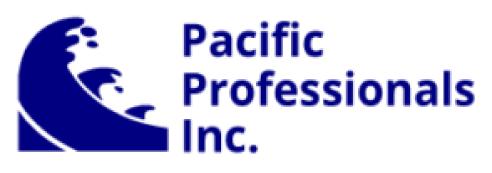
Place your ad in the Career Center at cvma.net. There are two options for classified advertising:
1. Online advertising
2. Online and in one issue of the California Veterinarian
CVMA Members NonMembers
*Price includes the first six lines of text. Each additional line is $10/$11 for non-members. A line consists of approximately 50 characters.
**If you wish to place a print ad only, contact Laura Phillips at 916.649.0599 or classifieds@cvma.net.
Online only
30 days online $169 $249
60 days online $269 $349
90 days online $369 $449
Online and in one issue of the California Veterinarian
60 days online + one issue of the California Veterinarian $319 $399
90 days online + one issue of the California Veterinarian $419 $499
POST AN ANONYMOUS RESUME OR AD
Resume— Post a confidential resume. Go to cvma.net. Click on the Resources tab then Classifieds in the right menu to get started.

Ad — Place a confidential ad by creating an anonymous email address and using it when posting your ad.
If you have any questions, please contact customer service at 860.437.5700, clientserv@yourmembership. com, or classifieds@cvma.net.
Issue
Jan/Feb
March/April
May/June
July/Aug
Sept/Oct
Nov/Dec
Deadline
December 5
February 5
April 5
June 5
August 5
October 5
If your ad is received after the deadline, it will go into the following month’s California Veterinarian. After the deadline, the CVMA cannot alter or cancel ads. The CVMA reserves the right to edit copy and does not assume liability for contents of classified advertising. Prices subject to change without notice.
Employment opportunity at an established, profitable practice, featuring a flexible schedule, to allow plenty of personal time, and generous signing bonus, housing and student loan reimbursement. The clinic is privately owned, well loved by the community and offers an exceptional support staff. The emphasis is always on learning and quality of care. The facility itself boasts modern updates, including digital x-ray, dental x-ray, full in-house lab and ultrasound. We also have a fully stocked pet store. Located in the scenic Santa Cruz Mountains and with easy access to the Bay Area, this job comes with a most desirable lifestyle. The right candidate can expect a generous compensation package, ongoing education and an assertive career path, including ownership potential. Email bcvet@aol.com.
Shenandoah Valley Veterinary Clinic is looking for another doctor to help in our small and thriving clinic located in the Sierra foothills of Amador County. Preferably one to two days a week but, we are open to a schedule that can be creative and flexible. Regular relief, one to four days a month, would be considered also. The schedule would be primarily covering daytime appointments. If there was a strong desire and ability to do surgeries that could be considered as well. We have digital x-ray, dental x-ray, ultrasound, Companion laser, in-house lab, and a great support staff! Contact Dr. Elida Malick at eam.dvm@gmail.com.
Skyline is RVT owned and is in need of a doctor, as everyone else. I would like to take on a partner, or sell the practice. We are located across the street from the Daly City DMV and one block away from In-N-Out Burger and Krispy Kreme. Contact Information: skylinepethospital@yahoo.com; Work: 650.756.4877, between the hours of 10:00am to 4:00pm; Cell: (415) 370-2094.
Small Animal Practice, stone’s throw from Heavenly Valley Ski Resort, and short drive to South Lake Tahoe. Great opportunity to live in a country setting, ski in the morning, work in the afternoon, and enjoy all the mountain amenities. Good schools, reasonable real estate, close to shopping. The Vet practice is located in the small town of Gardnerville (Carson Valley). 1,800 square foot leasehold facility, 2 exam rooms, trained staff. Practice includes over $300K of lab equipment, including digital x-ray machine and vet lab station. Currently operating with two DVMs and six long tenured local staff. Go to Animal Medical Services website www.animalmedicalservicesnv.com or the Facebook page for more information on DVM’s and practice. 2021 Gross $1,300,000. Practice growing at 15% per year. Practice price $930,000. Call Brian Burns CPA for more details, 707.481.7167 or email bmbsurrey67@gmail.com.
Wanna be your own boss? Practice exactly how you would like? Student loans? Pfft! Thirty-year-old practice in beautiful Sonoma County, 1 hour north of San Francisco. New digital x-ray, Hospital could use some upgrading. Owner willing to transition, mentor, work part-time. Suitable for two. 2021 gross – $1,080,000. Contact heyheydrj@aol.com.
DOWNLOAD NOW AT THE GOOGLE PLAY AND APPLE STORES.
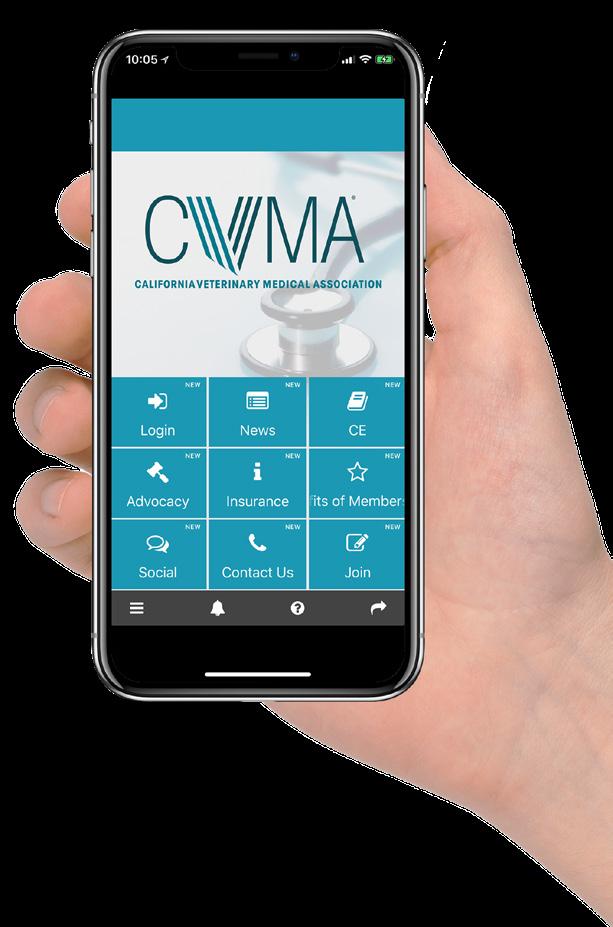


Reach thousands of veterinary professionals from across the state and connect with your target audience! With both print and digital advertising opportunities, we have something for all advertising budgets.

The California Veterinarian magazine is mailed to approximately 13,500 readers, including all California licensed veterinarians.
The Weekly e-newsletter is emailed to approximately 7,000 CVMA members once a week and provides information about immediate issues affecting the veterinary profession.
The Upcoming CE e-blast provides CVMA members necessary information about our upcoming CE offerings and is emailed to approximately 7,000 recipients monthly.
